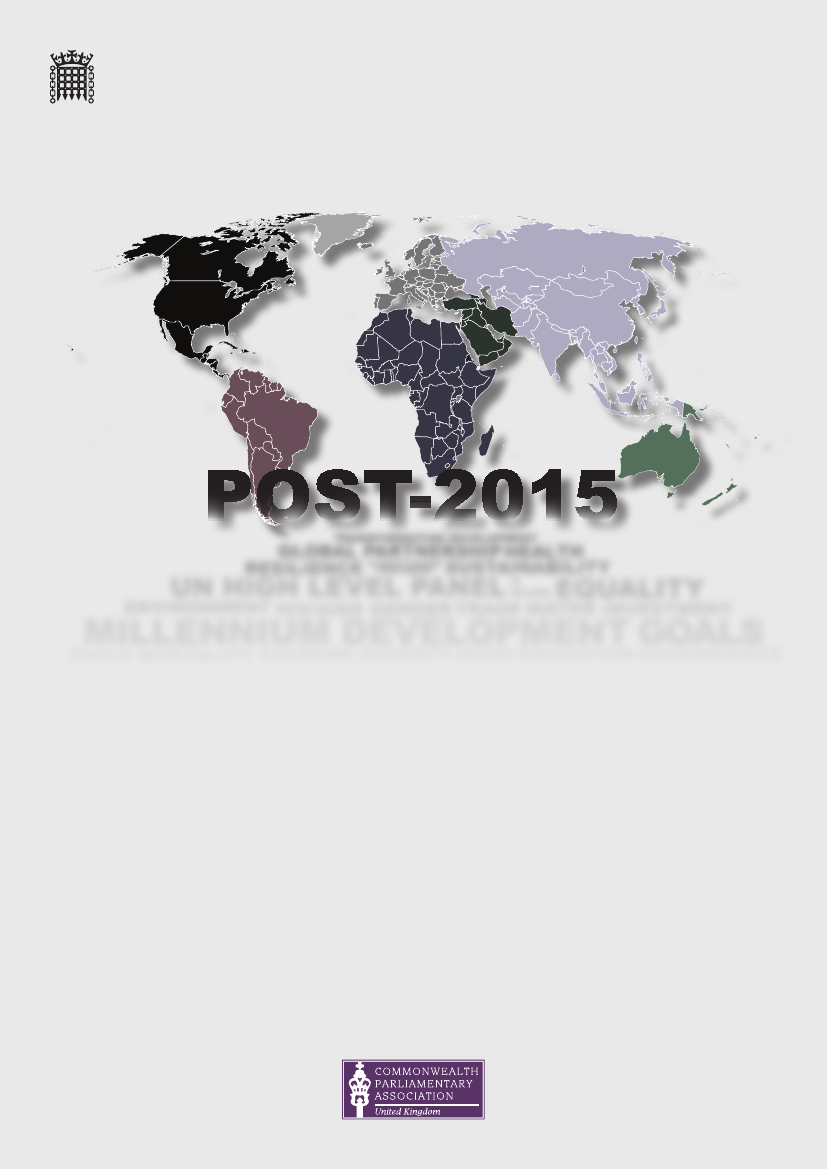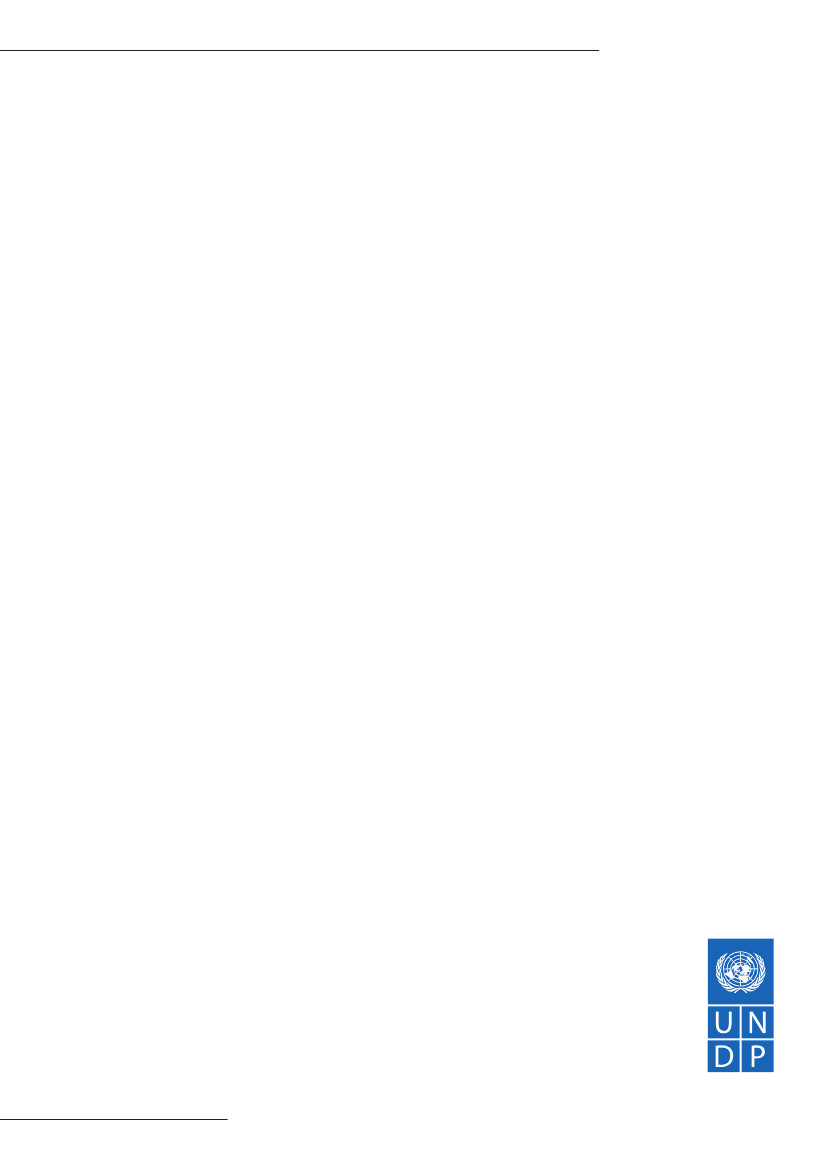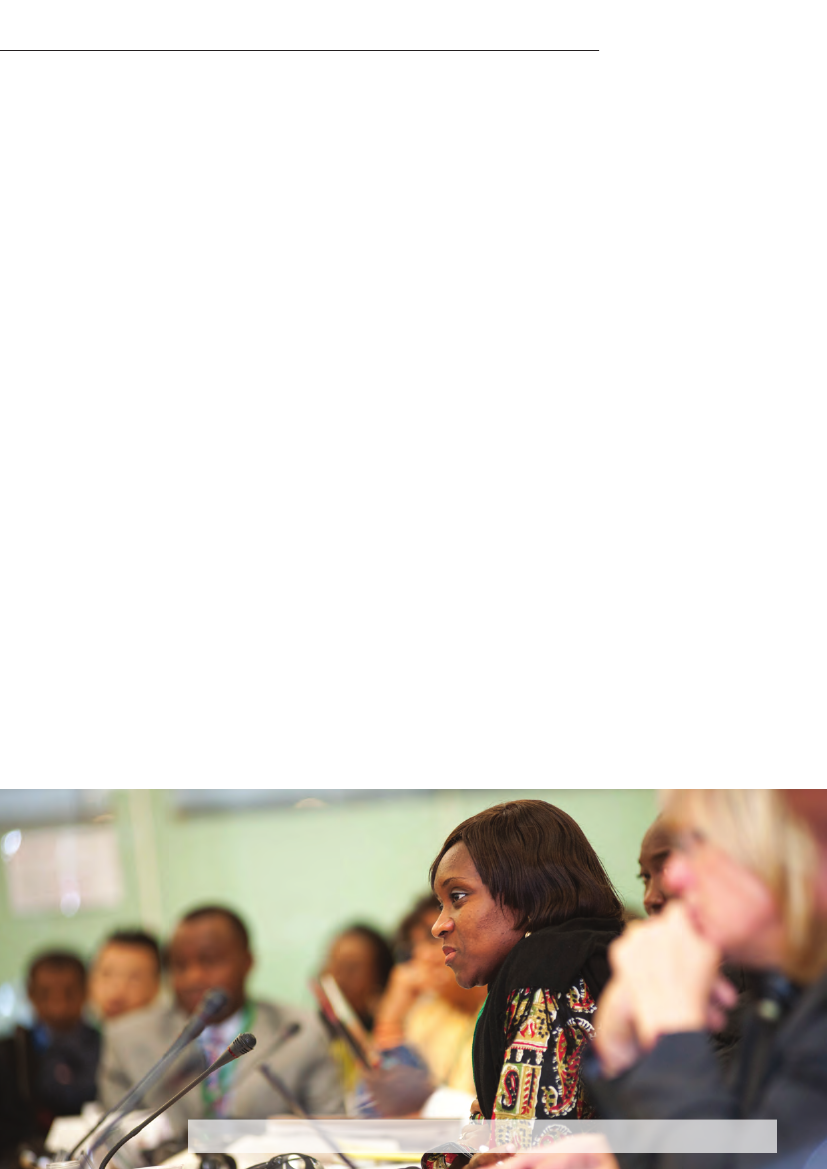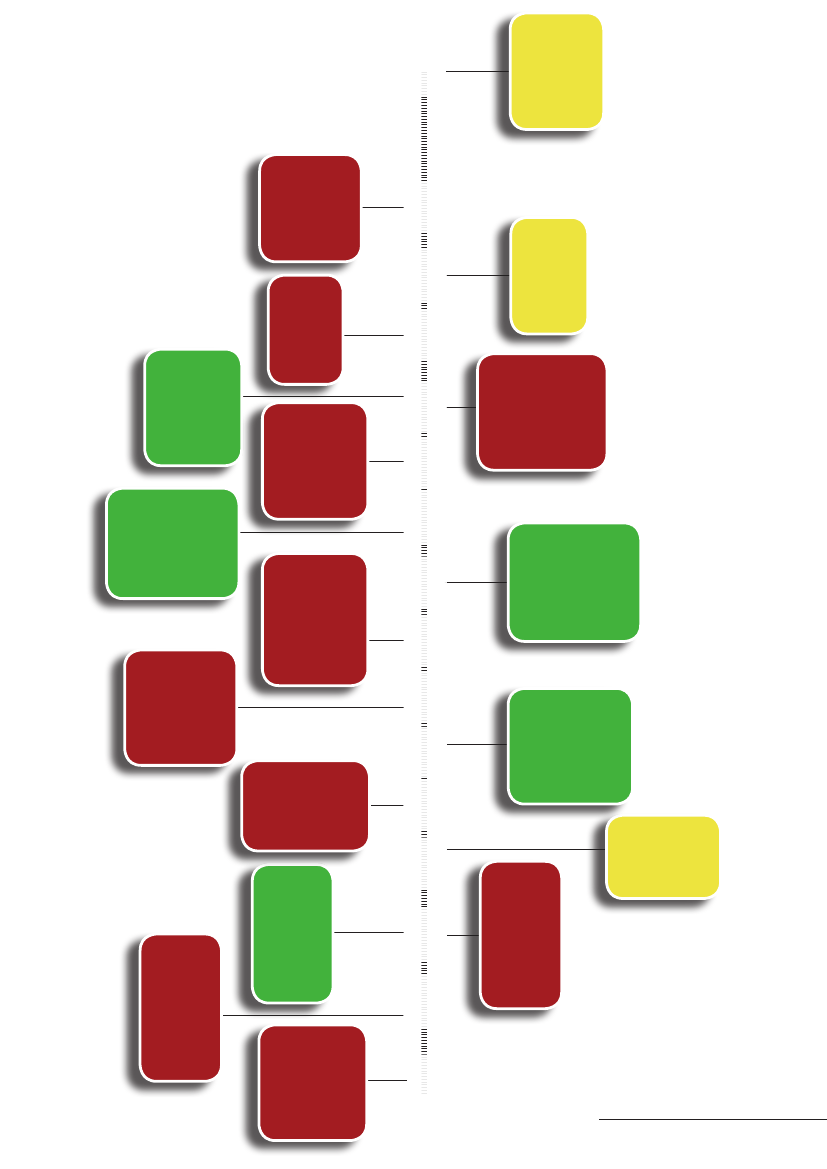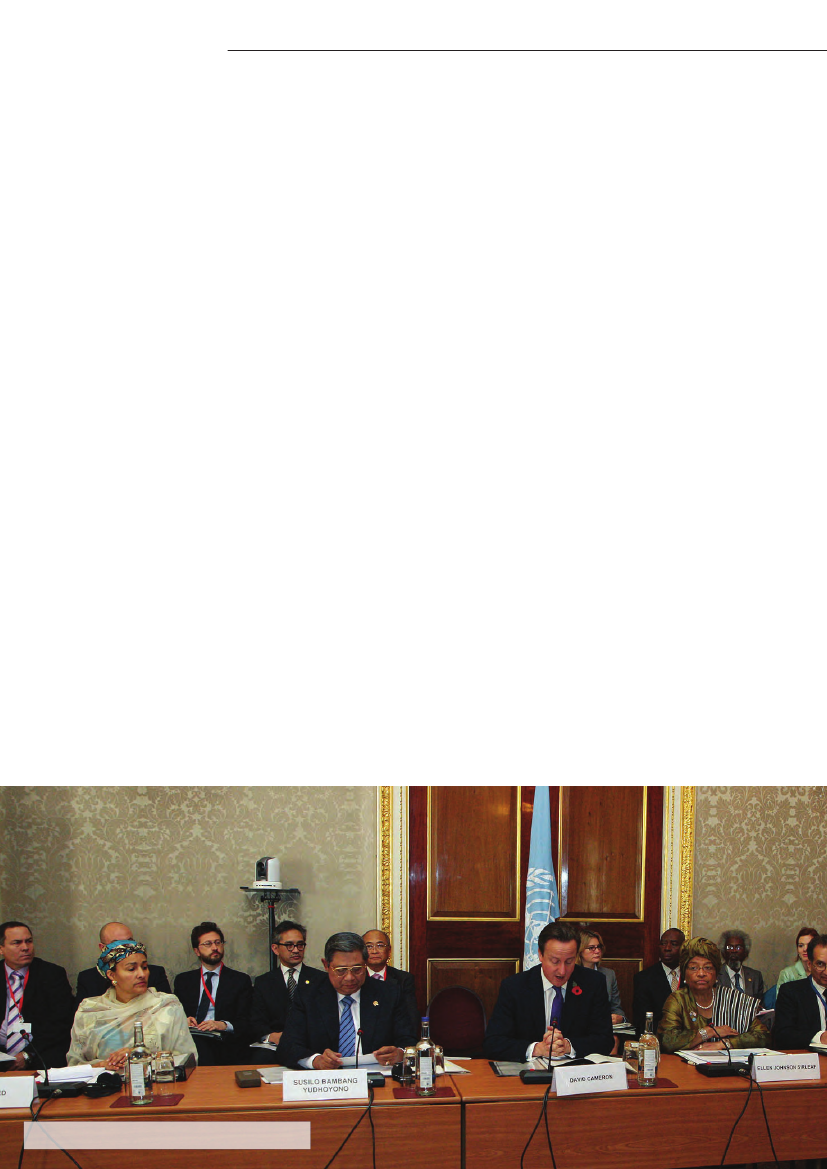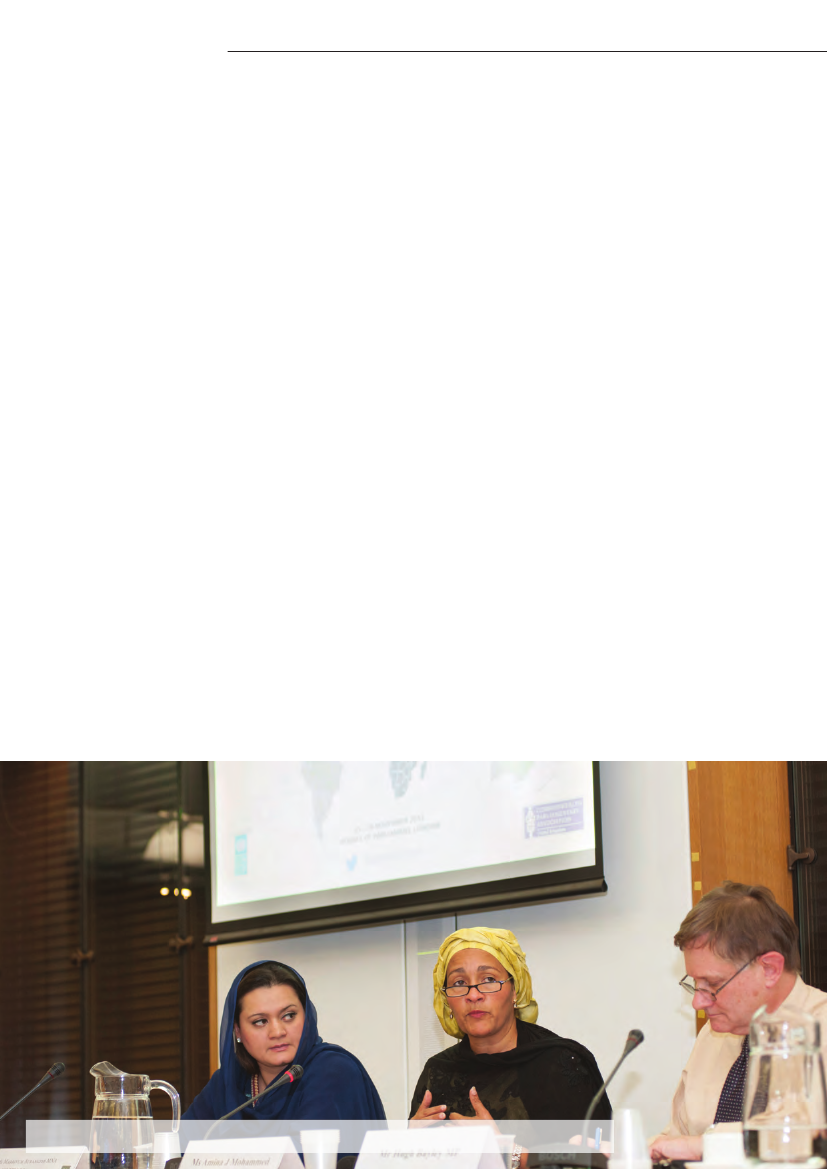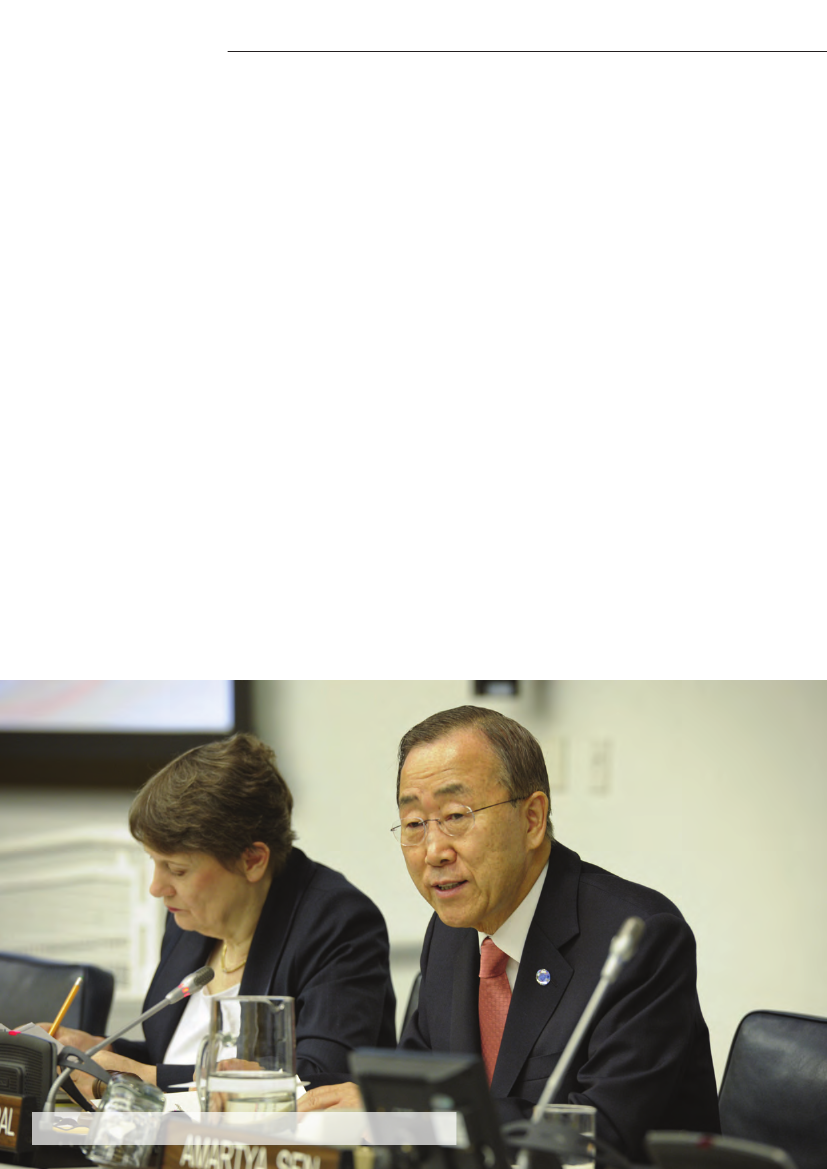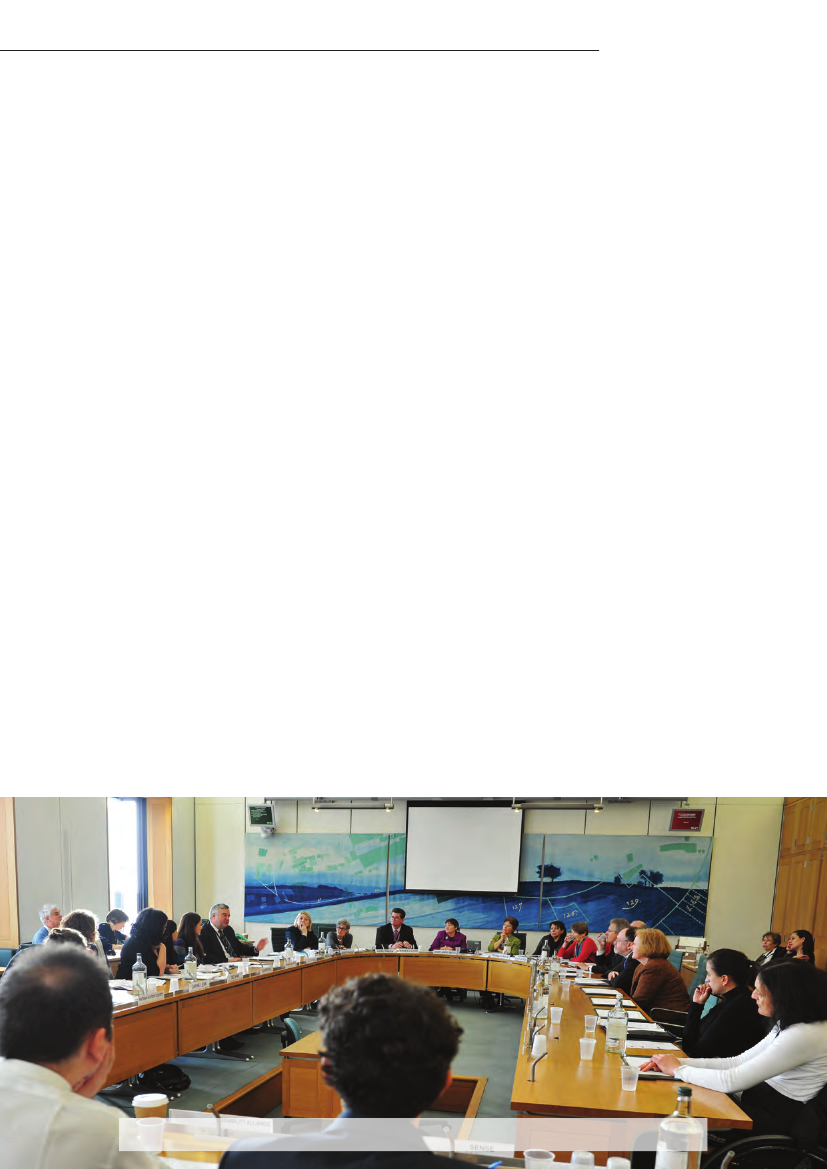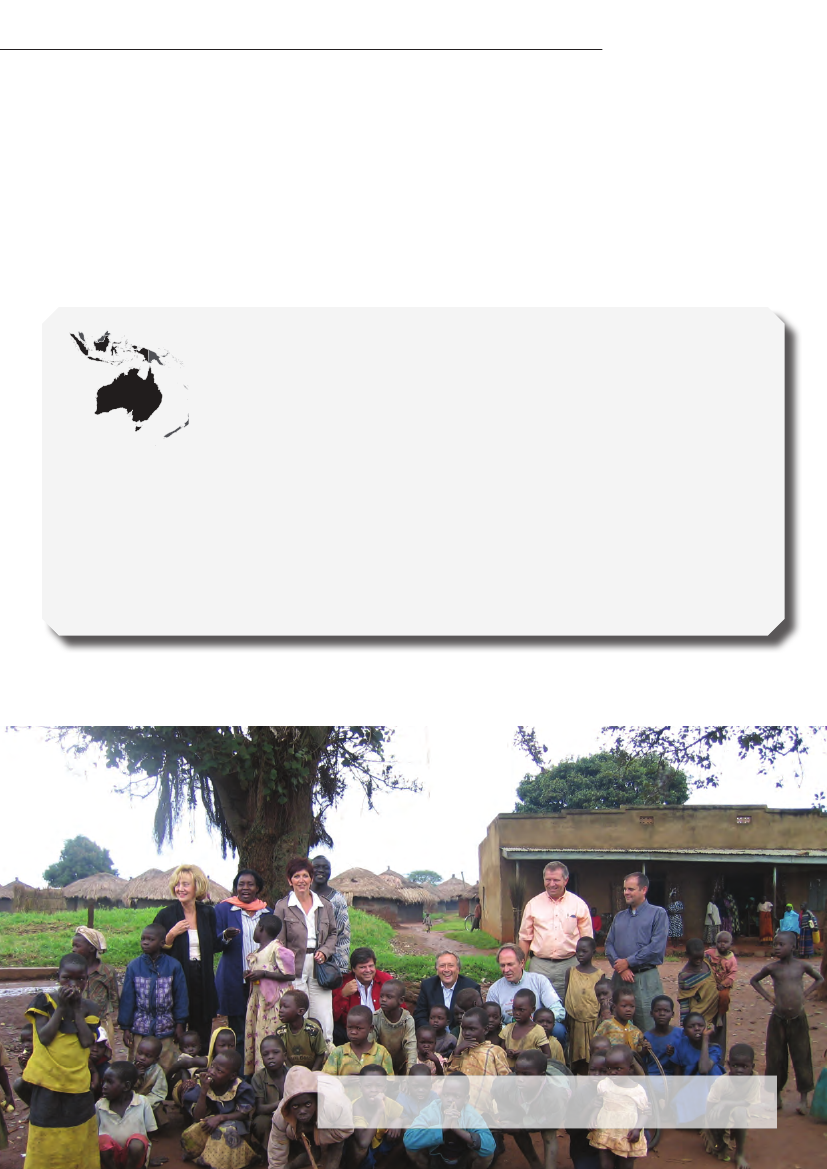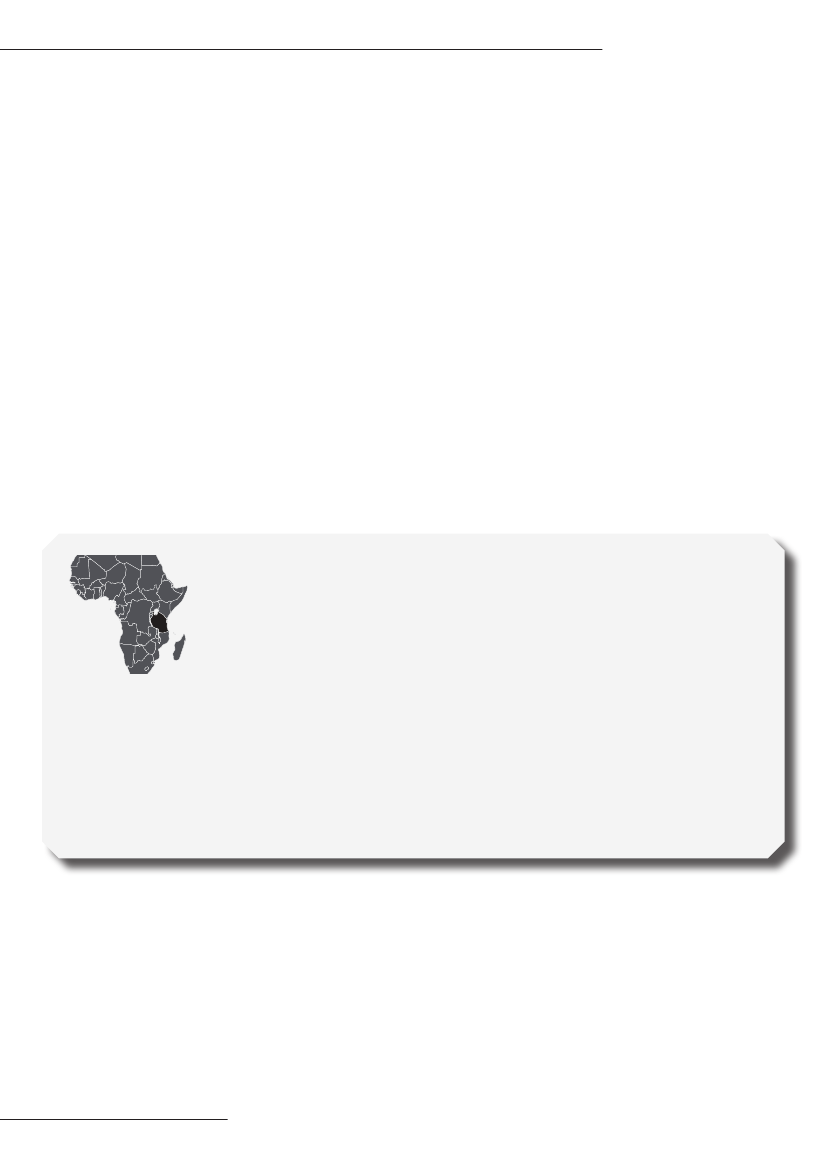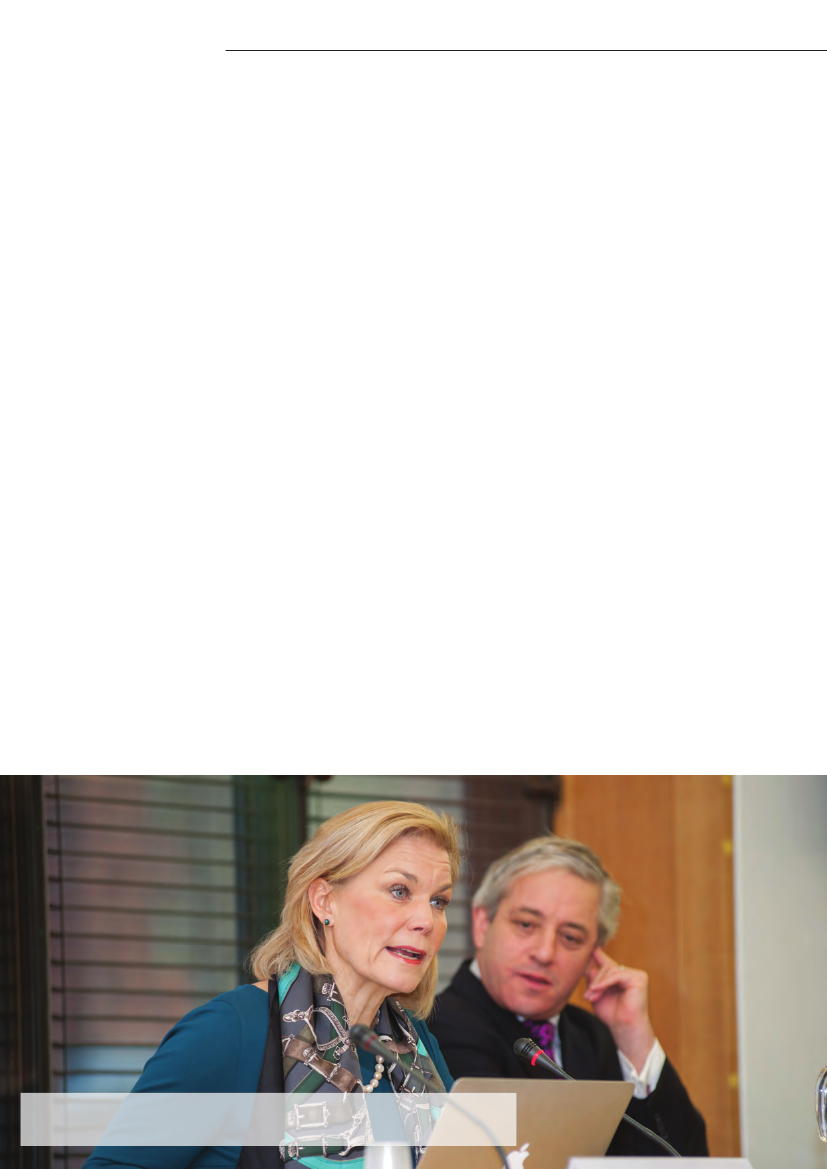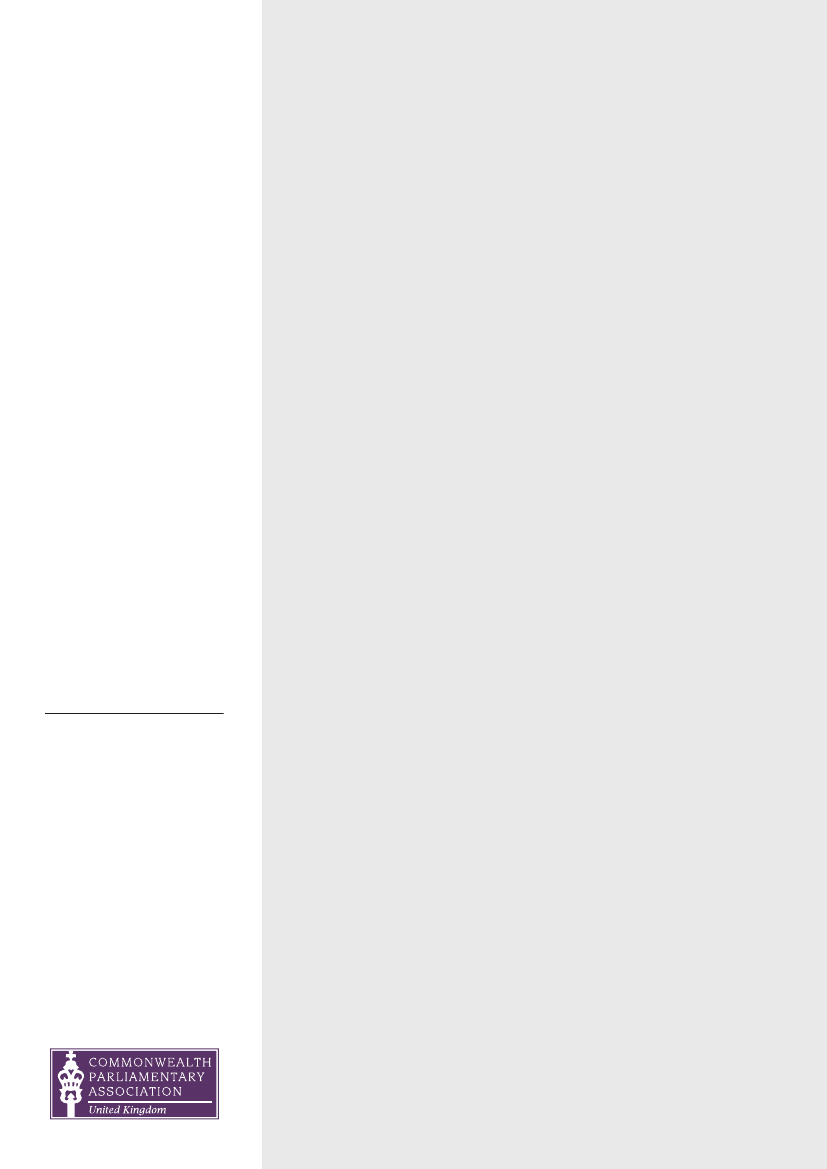Udenrigsudvalget 2013-14
URU Alm.del Bilag 187
Offentligt
HousesofParliamentHousesofParliament
MILLENNIUM DEVELOPMENT GOALSEDUCATIONGOVERNANCECHILD MORTALITY EXTREME POVERTYEMPLOYMENTHUNGER DEBT
ENVIRONMENT HIV/AIDS GENDER TRADE WATER INVESTMENT
UN HIGH LEVEL PANEL
GLOBAL PARTNERSHIP HEALTHCHANGEFOODRESILIENCECLIMATEPRICESSUSTAINABILITYTBMALARIA
TRANSFORMATION DEVELOPMENT
EQUALITY
toolkIt for ParlIamentarIansInternatIonal ParlIamentary ConferenCeon the
Post-2015 DeveloPment agenDaplacing parliamentarians at the centre of global development26 - 28 November 2013Houses of ParliameNt, loNdoN
Edited by James Kennelly, IPCP2015 Conference Adviser and designed by Matthew Salik,IPCP2015 Deputy Project Manager on behalf of CPA UKThis publication should be referenced as:International Parliamentary Conference on the Post-2015 Development Agenda (2013) Toolkitfor ParliamentariansIt can be found online atwww.parliament.uk/cpauk#post2015confFebruary 2014Empowered lives.Resilient nations.Supported by:
i
Contents1.2.3.4.5.6.7.8.9.10.exeCutIve summarymIllennIum DeveloPment goalsPost-2015 ProCesshIgh level Panel rePortParlIamentary meChanIsms to InfluenCe thePost-2015 DeBatemonItorIng the ImPlementatIon of the Post-2015 goalsPost-2015 aCtIon Plan for ParlIamentarIansConClusIonaCknoWleDgementsresourCesiii
147101425272829
lIst of Case stuDIesUnited KingdomBelgiumGermanySwedenPakistanAustraliaTanzaniaTonga1011121417182223
International Parliamentary Conference on the Post-2015 Development Agenda: Toolkit for Parliamentarians
ii
exeCutIve summaryThe Commonwealth Parliamentary Association UK Branch, supported by UNDP,delivered anInternational Parliamentary Conference on the Post-2015 Development Agenda at the Houses of Parliamentin London 26-28 November 2013. Delegates attending the conference expressed their commitment asparliamentarians from across the world to accelerate the process towards the achievement of the MillenniumDevelopment Goals (MDGs); they agreed to exchange information, knowledge and examples of good practicewith peers and international development experts; to build capacity to ensure that good governance is at thecore of the post-2015 development agenda; and to commit to holding governments to account to ensurethat international commitments to development are implemented at local, national and regional levels.Parliamentarians are key stakeholders in the design, implementation and oversight of the post-2015framework. There is a unique responsibility of elected parliamentarians to be the bridge between governmentsand citizens and delegates affirmed their commitment as the people’s representatives to work towards a setof targets with poverty eradication and sustainable development at its core. Integral to the framework areeffective and legitimate institutions that support peace and security, the rule of law, property rights, freedomof expression and a free media, open political choice, access to justice, and accountability.This toolkit provides information and advice to help parliamentarians to become actively involved in the post-2015 process. It is designed to provide a brief, user-friendly guide which parliamentarians can use flexiblyaccording to their individual interests and parliamentary role. In this publication you will find:• Background information on MDGs, the acceleration process and the progress towards the achievementof the MDGs• Details about the post-2015 process, the High Level Panel Report, the Outcomes from the UN MDGSpecial Event and the process leading up until September 2015.• Ideas from parliamentary colleagues on how parliamentarians can to influence the formulation of thepost-2015 development goals.• Examples and case studies explaining how parliamentarians can monitor the implementation of thepost-2015 development goals through their legislative, oversight, budget scrutiny and representationalresponsibilities.• A list of references and resources to assist parliamentarians in their work.There is much for parliamentarians to do – both in the formation of the new goals, and in ensuring thatthey are owned and acted upon at a national level. They should encourage constituents and stakeholders –including civil society, the media, and the private sector – to participate in discussions about the post-2015agenda. They should be the voice of women and girls – and other vulnerable and marginalised groups – toplace them at the centre of the new framework. Crucially, parliamentarians should ensure that governmentsare held accountable for the way they prioritise the new development goals, and the way they implementthem. In particular, parliamentarians should scrutinise the adequate, efficient and transparent allocation ofresources in national and local budgets.This toolkit is part of CPA UK’s work to foster cooperation and understanding between parliaments, promotegood parliamentary practice and advance parliamentary democracy. CPA UK’s membership comprisesMembers from both Houses of the United Kingdom Parliament and the organisation undertakes internationalparliamentary outreach on behalf of the Houses of Parliament and the wider CPA.
iii
mIllennIum DeveloPment goalsMDG BACKGroUNDThe Millennium Declaration, signed by 189 world leaders at the UN Millennium Summit in September 2000,recognised the relationship between development, good governance and human rights and set out thevalues, principles and objectives for the international agenda for the twenty-first century. This underlined thecollective responsibility of leaders to uphold human dignity, equality and equity for all people, especially themost vulnerable and marginalised. At the heart of this was a powerful vision of a global partnership to reducepoverty and inequality.Out of this document came an ambitious agenda for a global development framework that would run to2015. The eight MDGs (as outlined on the following page) were chosen to reflect a broad spectrum ofinter-related development challenges and include eradicating extreme poverty and hunger; universal primaryeducation; gender equality; improved maternal and child health; combating HIV/AIDS, TB, Malaria and otherdiseases; ensuring sustainable development; and developing a global partnership for development.The MDGs have subsequently served as the cornerstone of international development policy. They havebeen successful in aligning the efforts of development actors around concrete, measurable goals and havebeen useful as an advocacy tool for mobilising public support. The time-bounded benchmarks and indicatorsfor assessing progress have formed the basis for significant policy and institutional reforms and resourceallocations.
MDG ACCelerATioN FrAMeworKIn September 2010, world leaders recommitted to accelerate the progress towards the MDGs. In order tohasten progress on the MDGs, 10 countries piloted the acceleration approach. The acceleration frameworkhas helped countries to identify, prioritise and address constraints that make existing programs less effective.Furthermore, the MDG Acceleration Framework (MAF) provides a systematic way for countries to developtheir own action plan based on existing plans and processes to pursue their MDG priorities. Moreover, theframework helps governments to focus on disparities and inequalities, two of the major causes of unevenprogress, by particularly responding to the needs of the vulnerable.There is now a great deal of evidence about both the obstacles to MDG progress and how to overcome them.This evidence reveals that there is a range of tried and tested policies which, adapted to national contexts, willensure MDG progress, where there is the leadership, capacity, and funding to implement them. To accelerateMDG progress, as called for by the MDG Summit Outcome Document, this evidence must be put into practicein a concerted effort that takes us to 2015.
MDGS rePorT 2013 ProGreSSWith the deadline for the MDGs fast approaching, progress can be reported in most areas, despite the impactof the global economic and financial crisis. Several important targets have or will be met by 2015, assumingcontinued commitment by national governments, the international community, civil society and the privatesector. That said, progress in many areas is far from sufficient.
International Parliamentary Conference on the Post-2015 Development Agenda: Toolkit for Parliamentarians
1
mIllennIum DeveloPment goalsGoAl 1: erADiCATe eXTreMe PoVerTY AND HUNGerTARGET 1ATARGET 1BTARGET 1CHalve, between 1990 and 2015, the proportion of people living on lessthan $1 a day.Achieve full and productive employment for all including women and youngpeople.Halve, between 1990 and 2015, the proportion of people who suffer fromhunger.Ensure that, by 2015, children everywhere, boys and girls alike, will be ableto complete a full course of primary schooling.Eliminate gender disparity in primary and secondary education, preferablyby 2005, and in all levels of education, no later than 2015.Reduce by two thirds, between 1990 and 2015, the mortality rate ofchildren under five.
GoAl 2: ACHieVe UNiVerSAl PriMArY eDUCATioNTARGET 2A
GoAl 3: ProMoTe GeNDer eqUAliTY AND eMPower woMeNTARGET 3A
GoAl 4: reDUCe CHilD MorTAliTY rATeSTARGET 4A
GoAl 5: iMProVe MATerNAl HeAlTHTARGET 5ATARGET 5BReduce by three quarters the maternal mortality ratio.Achieve, by 2015, universal access to reproductive health.
GoAl 6: CoMBAT HiV/AiDS, MAlAriA, AND oTHer DiSeASeSTARGET 6ATARGET 6BTARGET 6CHalt and begin to reverse, by 2015, the spread of HIV/AIDS.Achieve, by 2010, universal access to treatment for HIV/AIDS for all thosewho need it.Halt and begin to reverse, by 2015, the incidence of malaria and othermajor diseases.Integrate the principles of sustainable development into country policiesand programmes and reverse the loss of environmental resources.Reduce biodiversity loss, achieving, by 2010, a significant reduction in therate of loss.Halve, by 2015, the proportion of the population without sustainable accessto safe drinking water and basic sanitation.Achieve, by 2020, a significant improvement in the lives of at least 100million slum dwellers.Develop further an open, rule-based, predictable, non-discriminatorytrading and financial systemAddress the special needs of the Least Developed Countries (LDCs)Address the special needs of landlocked developing countries and smallisland developing StatesDeal comprehensively with the debt problems of developing countriesthrough national and international measures in order to make debtsustainable in the long termIn co-operation with pharmaceutical companies, provide access toaffordable, essential drugs in developing countriesIn co-operation with the private sector, make available the benefits of newtechnologies, especially information and communications
GoAl 7: eNSUre eNViroNMeNTAl SUSTAiNABiliTYTARGET 7ATARGET 7BTARGET 7CTARGET 7D
GoAl 8: DeVeloP A GloBAl PArTNerSHiP For DeVeloPMeNTTARGET 8ATARGET 8BTARGET 8CTARGET 8D
TARGET 8ETARGET 8F
2
THe MilleNNiUM DeVeloPMeNT GoAlS: ProGreSS To DATe1Poverty continues to declineThe proportion of people living in extreme poverty has been halved at the global level. Theworld reached the poverty reduction target five years ahead of schedule. In developing regions,the proportion of people living on less than $1.25 a day fell from 47 per cent in 1990 to 22 percent in 2010. About 700 million fewer people lived in conditions of extreme poverty in 2010than in 1990.every region has made progress inimproving access to clean drinkingwaterMore than 2 billion people gained accessto improved sources of drinking water.Over the last 21 years, more than 2.1billion people gained access to improveddrinking water sources. Despite significantpopulation growth, the MDG drinkingwater target was met five years ahead ofthe target date.The hunger reduction target is withinreachThe proportion of undernourished peoplein developing regions decreased from 23.2per cent in 1990–1992 to 14.9 per cent in2010–2012. Given reinvigorated efforts,the target of halving the percentage ofpeople suffering from hunger by 2015appears to be within reach.remarkable gains have been madein the fight against malaria andtuberculosisBetween 2000 and 2010, mortality ratesfrom malaria fell by more than 25 per centglobally. An estimated 1.1 million deathsfrom malaria were averted over this period.Death rates from tuberculosis at the globallevel and in several regions are likely to behalved by 2015, compared to 1990 levels.Between 1995 and 2011, a cumulativetotal of 51 million tuberculosis patientswere successfully treated, saving 20 millionlives.A low debt burden and an improvedclimate for trade are levelling theplaying field for developing countriesThe debt service to export revenue ratio ofall developing countries stood at 3.1 percent in 2011, down from nearly 12 percent in 2000. Their duty-free market accessalso improved in 2011, reaching 80 percent of their exports. The exports of leastdeveloped countries benefitted the most.
CHAlleNGeS AHeAD2More progress is required regarding child survivalBig gains have been made in the child survival but more must bedone to meet our obligations to the youngest generation Worldwide,the mortality rate for children younger than five dropped by 41 percent—from 87 deaths per 1,000 live births in 1990 to 51 in 2011.Despite this enormous accomplishment, more rapid progress isneeded to meet the 2015 target of a two-thirds reduction in childdeaths. Increasingly, child deaths are concentrated in the poorestregions, and in the first month of life.Most maternal deaths are preventable, but progress in thisarea is falling short.Globally, the maternal mortality ratio declined by 47 per cent over thelast two decades, from 400 maternal deaths per 100,000 live births to210 between 1990 and 2010. Meeting the MDG target of reducingthe ratio by three quarters will require accelerated interventions andstronger political backing for women and children.Access to antiretroviral therapy and knowledge about HiVprevention must expand.While new HIV infections are declining, an estimated 34 millionpeople were living with HIV at the end of 2011. The MDG target ofuniversal access to antiretroviral therapy for all who need it by 2010was missed, but is reachable by 2015 if current trends continue. Theultimate goal is preventing the spread of HIV, but knowledge of thevirus and how to avoid transmission remains unacceptably low.Too many children are still denied their right to primaryeducation.Between 2000 and 2011, the number of children out of schooldeclined by almost half—from 102 million to 57 million. However,progress in reducing the number of children out of school has slowedconsiderably over time. Stalled progress means that the world isunlikely to meet the target of universal primary education by 2015.environmental sustainability is under severe threat, demandinga new level of global cooperation.The growth in global emissions of carbon dioxide (CO2) isaccelerating, and emissions today are more than 46 per cent higherthan their 1990 level. Forests continue to be lost at an alarming rate.Overexploitation of marine fish stocks is resulting in diminished yields.More of the earth’s land and marine areas are under protection, butbirds, mammals and other species are heading for extinction at anever faster rate, with declines in both populations and distribution.
1.2.
United Nations (2013) The Millennium Development Goals Report 2013, New York: United Nations. (http://www.undp.org/content/dam/undp/library/MDG/english/mdg-report-2013-english.pdfibid
International Parliamentary Conference on the Post-2015 Development Agenda: Toolkit for Parliamentarians
3
Post-2015 ProCessThe outcome document of the 2010 MDG Summit requested the Secretary-General to initiate thinking on theglobal development agenda beyond 2015. The Outcome Document of Rio+20 Conference on SustainableDevelopment in 2012 initiated an inclusive process to develop a set of sustainable development goals. Thereis broad agreement that the two processes should be closely linked and should ultimately converge in oneglobal development agenda beyond 2015 with sustainable development at its core. The process of arrivingat this new framework is Member State-led with broad participation from external stakeholders such as civilsociety organisations, the private sector and businesses, academia and scientists. The United Nations hasplayed a facilitating role in this global conversation andhas the responsibility of supporting Member States by“parliamentarians can play a central role inproviding evidence-based inputs, analytical thinkingrethinking the way policies are produced andand field experience. The Secretary-General willcontinue to provide overall leadership to the processcarried out. You can help to orient nationalwith the support of the Deputy-Secretary General andprogrammes towards sustainable developmentthe Secretary-General’s Special Advisor on Post-2015goals. You can bring the views and aspirationsDevelopment Planning.3UN General Assembly open working Group onSustainable Development Goals
A 30-member Open Working Group of the GeneralAssembly (OWG) is mandated by the Rio+20Outcome document to prepare a proposal on SDGsfor consideration by the Assembly at its 68th Sessionby September 2014. The Open Working Group wasestablished on 22 January 2013 by decision of theBan Ki-Moon,Secretary-General of theUnited NationsGeneral Assembly. The Rio+20 outcome documentstates that, at the outset, the OWG will decide on itsmethods of work, including developing modalities to ensure the full involvement of relevant stakeholders andexpertise from civil society, the scientific community and the United Nations system in its work.3.4.United Nations Sustainable Development Knowledge Platform, Post-2015 Process (http://sustainabledevelopment.un.org/index.php?menu=1561)Ban Ki-Moon, Message to the International Parliamentary Conference on the Post-2015 Development Agenda, 26 Nov 2013
of your citizens into the global arena. throughofficial development assistance and domesticresources, you can ensure that sustainabledevelopment efforts receive the financing theyneed. You can also promote gender equalityamong your own ranks. in all these ways,parliamentarians can drive our global campaign tousher in a more equitable and sustainable future.”4
4
Parliamentary delegates at the International Parliamentary Conference on the Post-2015 Development Agenda, London, 2013Image courtesy of CPA UK
Post-2015 tImelIne
ungeneralassemBlymDgrevIeWsummItun generalassemBly oPenWorkIng grouPon sustaInaBleDeveloPmentestaBlIsheDsDsnrePort “anagenDa forsustaInaBleDeveloPment”PuBlIsheD
mIllennIumsummIt:InCePtIon ofthe mDgsmDgaCCeleratIonframeWork
un systemtask teamrePort“realIsIngthe future WeWant for all”PuBlIsheD
IntergovernmentalnegotIatIons at the69th un generalassemBly
2000
September
201020112012
October
November
January
2012201220122013201320132013201320132014 2014
J u n e
J u l y
August
January
M a r c h
M a y
J u n e
J u l y
September
September
December
2015
September
un seCretary-generalreCeIvesmanDate onPost-2015
the un systemtask teamestaBlIsheD
estaBlIshmentof the hIghlevel Panelof emInentPersons
un system taskteam rePort “areneWeD gloBalPartnershIP forDeveloPment”PuBlIsheD
unseCretary-generalrePort“a lIfe ofDIgnItyfor all”PuBlIsheDrIo +20ConferenCe onsustaInaBleDeveloPmentgoals
oPen WorkInggrouP suBmItsIts fInalreCommenDatIons
heaDs ofstate summItaDoPtIngthe Post-2015goals
unsustaInaBleDeveloPmentsolutIonsnetWork(sDsn)launCheD
hIgh levelPanel rePortPresenteDto the unseCretary-general
un seCretary-general synthesIsrePort
International Parliamentary Conference on the Post-2015 Development Agenda: Toolkit for Parliamentarians
5
High-level Panel of eminent Persons on the Post-2015 Development AgendaIn July 2012 the UN Secretary-General launched his High-level Panel of Eminent Persons on the Post-2015Development Agenda. Co-chaired by the Presidents of Indonesia and Liberia and the Prime Minister of theUnited Kingdom, the Panel assembled representatives from civil society, private sector, academia and localand national governments. In May 2013 the Panel published its report “New Global Partnership: EradicatePoverty and Transform Economies through Sustainable Development” with its vision and recommendationson a global development agenda beyond 2015.UN System Task Team on the Post-2015 UN Development AgendaEstablished by the UN Secretary-General in January 2012, the UN System Task Team on the Post-2015 UNDevelopment Agenda assembles more than 60 UN agencies and international organisations. Co-chaired bythe Department of Economic and Social Affairs and the United Nations Development Programme the TaskTeam supports the process by providing analytical thinking and substantial inputs. The Task Team published itsfirst report titled “Realizing the Future We Want for All” in June 2012. The report outlined the vision of theUnited Nations system on the global development agenda beyond 2015.National, global and thematic consultationsIn order to facilitate an inclusive global conversation, the UNDP has initiated consultations at the national andglobal level as well as a set of eleven thematic consultations. National consultations took place in more than60 developing and developed countries and take various forms and shapes. They include online and offlineoutreach tailored to national circumstances and needs, and they are closely linked to national developmentpriorities. A set of eleven multi-stakeholder thematic consultations were convened on the following themes:education; inequalities; health; governance; conflict and fragility; growth and employment; environmentalsustainability; hunger, nutrition and food security; population dynamics; energy; and water. Each thematicconsultation was led by two or more UN agencies who work closely together with representatives from civilsociety, the private sector and academia as well as with co-hosting governments.Sustainable Development Solutions NetworkThe Sustainable Development Solutions Network (SDSN), led by Professor Jeffrey Sachs, is a global,independent network of research centres, universities and technical institutions that works with stakeholdersincluding business, civil society, UN agencies and other international organisations. As a first step, the networkwill establish 10 global expert groups to support global problem solving in ten critical areas of sustainabledevelopment. SDSN also provides technical support to the High-level Panel on the Post-2015 DevelopmentAgenda.UN Global CompactThe UN Global Compact has been actively involved in ensuring that the views and contributions of businessesand the private sector feed into the post-2015 process.
6
hIgh level Panel rePortDespite the MDGs’ shortcomings, a considerable level of success has been achieved and it would be a mistaketo simply start again from scratch. At the Rio+2012 Summit, world leaders agreed that new goals andtargets should encompass the respect for universal human rights, and finish the job that the MDGs started.A fundamental aspect of this vision is the eradication of extreme poverty from the face of the earth by 2030.The High Level Panel (HLP) have therefore agreed that a new development agenda should carry forward thespirit of the Millennium Declaration and the best of the MDGs, with a practical focus on things like poverty,hunger, water, sanitation, education and healthcare. But in order to accomplish the vision of promotingsustainable development there is a need to go beyond the MDGs. The importance to development of goodgovernance and institutions that guarantee the rule of law,free speech and open and accountable government was not“good governance matters for ourincluded, nor the need for inclusive growth to provide jobs.people, everywhere, so that they canMore importantly, the MDGs fell short by not integrating theparticipate and hold leaders accountable.economic, social, and environmental aspects of sustainableall over the world this is something thatdevelopment as envisaged in the Millennium Declaration, andby not addressing the need to promote sustainable patterns ofpeople see as a precondition alongsideconsumption and production.sanitation, housing and food. the hlpAccordingly, the Panel asked some simple questions: startingwith the current MDGs, what to keep, what to amend, andwhat to add. In trying to answer these questions, the panelconsidered the views of women and men, young people,parliamentarians, civil society organisations, indigenouspeople and local communities, migrants, experts, business,trade unions and governments.
report recognises that freedom from fear,conflict and violence are fundamentalhuman rights, as well as being theessential building blocks for peaceful andprosperous societies.”5Gunilla Carlsson,Former Minister for International DevelopmentCooperation, Sweden and High Level Panel Member
These meetings and consultations with the differentstakeholders convinced the HLP members of the need for a new paradigm. They concluded that the post-2015 agenda was to be an all inclusive universal agenda, driven by five big, transformative shifts:
5.
Gunilla Carlsson, Speech at International Parliamentary Conference on the Post-2015 Development Agenda, 26 Nov 2013
Un Secretary-General’s high Level Panel meeting in LondonImage courtesy of the Department for International Development
7
1. leave no one behindThat no person – regardless of ethnicity, gender, geography, disability, race or other status – is denieduniversal human rights and basic economic opportunities. The goals should focus on reaching excludedgroups and by providing social protection to help people build resilience to life’s uncertainties.2. Put sustainable development at the coreFor twenty years, the international community has aspired to integrate the social, economic, andenvironmental dimensions of sustainability, but no country has yet achieved this. There is an urgent needto act now to halt the alarming pace of climate change and environmental degradation, which poseunprecedented threats to humanity. This is a universal challenge, for every country and every person onearth. This will require structural change, with new solutions, and will offer new opportunities.3. Transform economies for jobs and inclusive growthA profound economic transformation is needed to end extreme poverty and improve livelihoods.Diversified economies, with equal opportunities for all, can unleash the dynamism that creates jobs andlivelihoods, especially for young people and women.4. Build peace and effective, open and accountable institutions for allThere are strong calls for a fundamental shift – to recognise peace and good governance as core elementsof wellbeing, not optional extras. Responsive and legitimate institutions should encourage the rule oflaw, property rights, freedom of speech and the media, open political choice, access to justice, andaccountable government and public institutions.5. Forge a new global partnershipPerhaps the most important transformative shift is towards a new spirit of solidarity, cooperation, andmutual accountability that must underpin the post-2015 agenda. A new partnership should be based ona common understanding of our shared humanity, underpinning mutual respect and mutual benefit ina shrinking world. This partnership should involve governments but also include others: people living inpoverty, those with disabilities, women, civil society and indigenous and local communities, traditionallymarginalised groups, multilateral institutions, local and national government, the business community,academia and private philanthropy.From vision to actionThe suggested targets are bold, yet practical. Like the MDGs, they will not be binding, but should bemonitored closely. The indicators that track them should be disaggregated to ensure no one is left behindand targets should only be considered ‘achieved’ if they are met for all relevant income and social groups.The Panel also recommended that any new goals should be accompanied by an independent and rigorousmonitoring system, with regular opportunities to report on progress and shortcomings at a high political level.Furthermore, new international initiatives must also be implemented to improve the quality of statistics andinformation available to citizens.6
6.
The Report of the High-Level Panel of Eminent Persons on the Post-2015 Development Agenda (2013) A New Global Partnership: Eradicate Poverty and Transform Economies through SustainableDevelopment, New York: United Nations. (http://www.post2015hlp.org/wp-content/uploads/2013/05/UN-Report.pdf)
8
oUTCoMeS FroM THe UN MDG SPeCiAl eVeNTOn 25 September 2013, the President of the UN General Assembly, John Ashe, hosted a Special Event toreview the progress made towards the achievement of the MDGs, and to discuss a post-2015 developmentagenda which would build on the existing goals. In the outcome document which was published followingthe event, member states renewed their commitment to meet the MDGs’ targets and agreed to hold a high-level summit in September 2015 to adopt a new set of goals.Member States agreed that the goals will build on the foundation laid by the existing MDGs, complete theunfinished business and respond to new challenges. They agreed that the new agenda should have povertyeradication and sustainable development at its core and that there should be a single set of goals. Theoutcome document outlined that the new goals would be universal in nature and applicable to all countries,while taking account of differing national circumstances and respecting national policies and priorities. Keyissues not addressed in the MDGs were promoted including: peace and security, democratic governance, therule of law, gender equality and human rights for all.Post-2015 process moving forwardThe Outcome Document gave the clearest indication of the next steps for deciding the new developmentagenda which will culminate in a Heads of State Summit in September 2015 for the formal adoption of thepost-2015 development agenda. Leading up to this, intergovernmental negotiations will be launched at thebeginning of the 69th UN General Assembly in September 2014. Member States will engage to bring thepost-MDG and SDG processes together. Feeding into the intergovernmental negotiations both the OpenWorking Group and the Intergovernmental Committee of Experts on Sustainable Development Financing willfinalise their reports by September 2014 as mandated in the Rio + 20 Outcome Document. In addition, theUN Secretary General will publish a report in the last quarter of 2014 which will pull together the inputs fromthe different reports and set out the negotiations.7
7.
United Nations General Assembly, Special Event 25 September: Outcome Document, New York, United Nations, 25 September 2013. (http://www.un.org/millenniumgoals/pdf/Outcome%20docu-mentMDG.pdf)
Marriyum Aurangzeb MnA, Pakistan; Amina J. Mohammed, Un; and hugh Bayley MP, UK presenting at the InternationalParliamentary Conference on the Post-2015 Development Agenda, London, 2013Image courtesy of CPA UK
98
ParlIamentary meChanIsms toInfluenCe the Post-2015 DeBateAs we approach the MDG deadline, we must consider the role of parliaments in continuing to promotedevelopment objectives. Participation, transparency and accountability are playing an increasingly importantpart in the post-2015 development agenda. The Outcome Document from the UN Special Event on MDGs inSeptember mentioned that the new set of goals should “promote peace and security, democratic governance,the rule of law, gender equality and human rights for all”.8Parliamentarians play a critical role in meetingthese requirements through their lawmaking, budgeting, and oversight functions and their roles as therepresentatives of the electorate, in particular of the poorest and most marginalised communities.In September, UN Member States affirmed their commitment “to a transparent intergovernmental processwhich will include inputs from all stakeholders including civil society, scientific and knowledge institutions,parliaments, local authorities, and the private sector”.9However, the onus - and responsibility - is onparliamentarians to engage with these negotiations, which will be launched at the beginning of the 69th UNGeneral Assembly in September 2014. There are a number of mechanisms at their disposal:Debates:The most high profile way of debating the future goals is through the use of parliamentary debates. Suchdebates provide useful moments for drawing media attention to the post-2015 development agenda. Privatemembers can also try to move debates on the post-2015 development agenda or related topics of interestdepending on parliamentary procedures.questions (oral and written):Another mechanism is the use of oral and written questions. Questions on how the Government plansto engage with parliamentarians in the post-2015 development framework can be asked to the ministerresponsible. Alternatively parliamentarians can ask written or oral questions to specific ministers to determinetheir priorities on certain thematic issues which fall within their remit. The purpose of asking parliamentaryquestions is to obtain information, raise awareness and to influence the government on issues.
UK Case StudyUK international Development Committee inquiryThe International Development Committee (IDC) led an inquiry which sought to contribute to the broaderdebate around the post-2015 development agenda. The impetus for the report was born out of the BritishPrime Minister’s prominent role in the High-Level Panel of Eminent Persons. The IDC received 82 pieces ofwritten evidence from a wide range of individuals and organisations. Some submissions addressed the issuesvery broadly; others focused on particular areas of expertise (Action for Global Health UK, for example,focused on health issues). It also held three oral evidence sessions to question expert witnesses including Amina Mohammed, theSpecial Adviser of the Secretary-General on Post-2015 Development Planning and Rt Hon Justine Greening MP, the Secretary of Statefor International Development.On 22 January 2013 the IDC published its Eighth Report of Session 2012-13, Post-2015 Development Goals. The report provided amore detailed exploration of the processes by which the post-2015 development goals are being developed and the consultationswhich are being undertaken. It also considered what the overarching purpose of the new goals and assessed the potential contentand structure of the new framework, including a consideration of the role of targets and indicators. In response to the report theGovernment addressed many of the conclusions which helped to contribute to the post-2015 discussions.
8.9.
United Nations General Assembly, Special Event 25 September: Outcome Document, New York, United Nations, 25 September 2013.(http://www.un.org/millenniumgoals/pdf/Outcome%20documentMDG.pdf)Ibid
10
Committee hearings:Committees are universally found in parliaments across the world. A parliamentary committee is a group ofparliamentarians appointed by one chamber (or both chambers, in the case of joint committees in a bicameralparliament) to undertake certain specified tasks. Committees offer a setting which facilitates detailed scrutinyof draft legislation, oversight of government activities and interaction with the public and external actors. Asignificant part of parliamentary work is now conducted in committees rather than in the parent chamber.Parliamentary committees can be used to carry out more detailed investigation into the nations priorities withregard to the post-2015 development agenda. Committees provide the space to consider issues in greaterdepth and give an opportunity to hear testimony from independent experts and civil society representatives.Some committees have establish working groups which promote engagement and discussion of the post-2015 development agenda within parliament and make recommendations on what position the Governmentshould take in intergovernmental negotiations.
Belgian Case StudyForeign Affairs and Defence Committee of the Belgian SenateIn March 2012, the Foreign Affairs and Defence Committee of the Belgian Senate set up a Working Groupon the Post 2015 Development Goals. The Working Group requires the Belgian Senate to maintain andstrengthen the achievements and results of the current framework of the MDGs. Concurrently, the WorkingGroup requests that the government proactively contribute to the formulation of a new framework for thedevelopment and post-2015 international cooperation.The Working Group held a symposium on 14 March 2013 which focused on the theme “The Future we Want for All” invited NGOsand world-renowned experts in the field of sustainable development, climate, education, agriculture and food. On the basis of theseactivities, a draft resolution on the post-2015 Development Agenda was adopted at the Plenary Session of the Senate on 13 June2013. In this resolution (doc. Senate, n� 5-2098/4), the Senate makes a number of recommendations to the government, reminding itof its commitment to dedicate at least 0.7% of the Gross National Product to Official Development Assistance. It also pleads with thegovernment to ensure gender equality by promoting gender mainstreaming and to further sustainable development. Furthermore, itcalls on the Belgian authorities to act primarily within the multilateral framework of the MDG post 2015.
“the problem when designing new agendas is that although memberstates in new York are representatives of all of your countries, theymostly reside in the ministry of foreign affairs, sometimes ministry of(international) development. therefore, the interface at the countrylevel does not happen as it should and therefore does not necessarilyreflect the priorities that we see when we come down to the ground.how can we better get you engaged with the country representativesin new York? this is a really critical part of the whole negotiation.”10Amina J Mohammed,Assistant Secretary General and Special Adviser toUN Secretary General on Post 2015 Development Planning
10.
Amina J Mohammed, Speech at International Parliamentary Conference on the Post-2015 Development Agenda, 28 Nov 2013
International Parliamentary Conference on the Post-2015 Development Agenda: Toolkit for Parliamentarians
11
intergovernmental negotiations:Parliamentarians are often included in governmental delegations at intergovernmental negotiations whichwill be important in the post-2015 process when they start in September 2014. This provides them withan opportunity to influence their respective country’s policy and keep them informed of the progress andoutcome of these negotiations. In addition, parliamentarians can pass resolutions which offer guidance togovernment negotiators so the views of their constituents are represented in the negotiations.international conferences:Another important way in which parliamentarians can become better aware of the post-2015 developmentagenda is through participation in regional or international parliamentary networks. Events organised byinternational organisations such as the Inter-Parliamentary Union (IPU) or the Commonwealth ParliamentaryAssociation (CPA) and regional networks such as the Southern Africa Development Community (SADC)Parliamentary Forum or Asia-Pacific Parliamentary Forum can be useful forums for Parliamentarians to discussthe post-2015 development agenda and share good practice about ways in which national Parliaments haveeffectively engaged with the process.
German Case StudyPublic forums in the German BundestagPrior to the recent Parliamentary elections on 22 September 2013, the German Bundestag in its 17thelectoral term carried out numerous activities with reference to shaping a global agenda on development andsustainability. Under the auspices of the standing Committee of Economic Cooperation and Development,two public hearings were held.The first public hearing, on 16 June 2010, referred specifically to the implementation of individually selected MDGs; the issuesof hunger, health, education and development partnerships. The German Bundestag reaffirmed that the federal government stillprioritized the MDGs and that steps were being taken to identify what Germany can do in practical terms to the achievement of theMillennium Development Goals. Further to this, on the basis of the UN inventory, all of the committee members and experts wereexpected to investigate which goals have achieved partial or complete success.The second public hearing, in conjunction with the Subcommittee of the United Nations, International Organisations and Globalisation,took place with the objective of; reviewing the state of progress towards achievement of the MDGs and considering which lessonscan be learned from the successes and failures of the MDG process for the post-MDG agenda; providing information on the workof the international organisations, commissions and working groups engaged on preparation of the post MDG agenda and the SDGprocess; and discussing suggestions and ideas about the post-MDG agenda and SDG process which have already been formulated bythe Federal Government, scientific and economic circles, and non-governmental organisations working in the field of environmentaland climate protection – in both parts, North and South.
12
Constituency meetings and public forums:Parliamentarians need to establish dialogue with voters by providing information to their constituents on thepost-2015 development agenda and receiving feedback from constituents on the effectiveness of governmentposition at a grassroots level. There are a number of mechanisms that can be used by parliamentarians toestablish this dialogue with voters. These mechanisms include holding public outreach or ‘town hall’ stylemeetings, holding meetings with village chiefs or traditional leaders, undertaking field visits to places likeschools, hospitals or businesses and holding constituency meetings or ‘surgeries’ in order to give citizens theopportunity to raise issues of concern. In addition, parliamentarians can provide information to their voterson the post-2015 process through newsletters, website or social networking sites, or speaking on radioprogrammes.Meetings with relevant stakeholders:In most countries national governments, local authorities, international development partners, civil societyorganisations, private sector and academia have all contributed input into the post-2015 development agenda.For a Parliament to fully engage with these issues, it is important that information is shared and interactionoccurs between the Parliament and all of the relevant stakeholders. This information and interaction cancome in the form of formal documentation or in workshops or briefing sessions for parliamentarians.
Un Secretary-General, Ban Ki-Moon and UnDP Administrator, helen ClarkImage courtesy of UNDP
13
monItorIng the ImPlementatIon ofthe Post-2015 goalslearning from the MDGsThere can be no democratic system of government without transparency and accountability. The primaryresponsibility in this field falls squarely on the shoulders of parliament. Parliamentarians play a key role inmonitoring and holding their executives to account in upholding their international, regional and nationalcommitments. Parliaments monitor their governments through representation, lawmaking, budgeting andoversight functions. The mechanisms available to parliamentarians in monitoring the implementation of thepost-2015 development goals can be explored by examining the lessons learned from the MDGs providingan accountability framework which can be replicated by different parliaments.
leGiSlATioNParliaments play a central role in the legislation process whether it is by introducing, scrutinising or reviewinglegislation. Although the legislative process differs from country to country all draft laws must pass throughParliament and therefore parliamentarians are in an influential position to engage with and influence theimplementation of the post-2015 development goals. In the post-2015 environment it is essential thatParliaments ensure that the post-2015 development goals are reflected in national policies and that thenecessary enabling legislation is in place.The lessons from the MDGs taught us that parliamentarians can legislate more effectively if they are involvedearlier in the process of drafting and amending laws. This requires the executive branch of government toinclude parliament at the earliest possible stage, for instance in the drafting of White Papers, and schedulinga sufficient time frame for new legislation to be adequately scrutinised. Parliaments can maximise theirresources and increase their legislative capacity by utilising international parliamentary networks, drawing ontechnical support from international development agencies and partnering with civil society groups.Subscribing to the post-2015 development goals and assessing progress toward achieving them may notnecessarily need additional laws to be passed in order to create an enabling environment for progresstowards implementing policies needed to achieve the goals. However, the legislative process can be used byParliaments to create a framework for monitoring progress toward achieving the goals by assessing whetherthe draft laws under discussion will impact positively on achieving the goals.Passing legislation is only part of the solution towards achieving the post-2015 development goals. Monitoringand overseeing the implementation of legislation and policy is an equally important function of a Parliament.1111.United Nations Development Programme (2010) Parliamentary engagement with the MDGs: a Manual for Use in Parliaments, New York: United Nations. (http://www.undp.org/content/dam/aplaws/publication/en/publications/democratic-governance/dg-publications-for-website/a-manual-on-parliamentary-engagement-with-the-millennium-development-goals/Parliamentary%20Engage-ment%20with%20the%20MDGs.pdf)
Swedish Case StudyShared responsibility - Sweden’s Policy for Global DevelopmentIn Sweden, the government launched a bill – Shared Responsibility: Sweden’s Policy for Global Development– that brought all components of Sweden’s development policy together, and took a comprehensiveapproach to policy areas (debt, trade, agriculture, education environment and migration). This legislationensures a coherent and consistent development policy, because the country speaks with one voice ininternational fora. The bill was debated and improved by the Swedish Parliament which further requestedan annual report on progress on implementation of the new policy.1212.United Nations Development Programme Issue Brief (2013) Parliament’s role in defining and promoting the Post-2015 Development Agenda, New York: United Nations
14
legislative mechanisms:
• Debating
the legislation:Theprocess of passing legislation willusually provide the opportunity todebate and scrutinise bills. This caninvolve asking questions and tablingamendments to suggest more effectiveways of implementing the post-2015development goals. At certain stagesof a bill parliamentarians are given theopportunity to debate specific clausesin a bill and debate any proposedamendments.
“a strong legislature is essential for democratisationand public accountability. capable parliamentsintroduce, scrutinise, and oversee national policies,legislation, and budgets; they ensure theirimplementation; and they ensure that all citizens,including the most marginalised and disempowered,have their voices heard.”13Helen Clark,Administrator of the UnitedNations Development Programme
• working in committees:A more detailed examination of the legislation often occurs when a bill goesto Committee. This provides an opportunity for parliamentarians to scrutinise legislation in-depth inorder to assess the potential impact of the draft law and to correct any inconsistencies. Parliamentariansoften receive input from civil society organisations, academics, subject experts, businesses and citizenswhich increases the access to relevant and current information on important issues. Gathering the viewsof these stakeholders assists Parliaments in assessing the likely impact of the legislation and providesperspectives on the ground in the country and within constituencies.
• introducing Private Members’ Bills:In some parliaments individual members are able to introduce
bills. Procedures for this vary and generally, few bills will pass onto the statute books. Often the value ofthe bill is not in introducing new legislation but in highlighting an issue and pressuring the governmentto take action.accompany new legislation to include consideration of the likely impact of proposed legislation. This willensure that interested stakeholders (government, parliament, civil servants and civil society) are cognisantof the post-2015 development goals from the very outset of the legislative process.
• requesting explanatory notes:Parliaments can call for explanatory notes or impact analyses that
“parliamentarians will have an important role not just in thedevelopment, but also in the delivery of the new developmentagenda...We need the parliamentarians to have the necessarycapacities at all levels to make governments translatecommitments into real action plans”14Rt Hon. Alan Duncan MP,Minister of State for InternationalDevelopment, United Kingdom
13.14.
Helen Clark, Video message for International Parliamentary Conference on the Post-2015 Development Agenda, 26 Nov 2013 (http://www.undp.org/content/undp/en/home/presscenter/speech-es/2013/11/26/helen-clark-text-of-video-message-to-the-united-kingdom-commonwealth-parliamentary-association-international-parliamentary-conference-on-the-post-2015-development-agenda.html)Rt Hon. Alan Duncan, Speech at International Parliamentary Conference on the Post-2015 Development Agenda, 25 Nov 2013
International Parliamentary Conference on the Post-2015 Development Agenda: Toolkit for Parliamentarians
15
oVerSiGHTA key function of most Parliaments is the oversight function. The government is usually accountable tothe Parliament and the Parliament is therefore in a position to oversee and monitor policy implementationto ensure government and individual ministries are held to account in their international commitments.Parliaments can use their oversight responsibility to assess what progress is being made, examine whethergovernment policy is being effectively implemented and analyse what impact these policies are having onachieving the targets. Lessons from the MDGs have show that the oversight function of Parliaments has beenan important entry point to engage with the MDGs and make the MDGs central to their work. For example, inmany countries, governments have worked with international development partners and domestic civil societygroups to produce annual or biannual MDG reports or MDG progress reports that outline the impact thatgovernment policy is having on making progress towards the MDGs. There are many different mechanismsthat a Parliament can use to oversee the implementation of the post-2015 development goals both in fullparliamentary plenary sessions and in parliamentary committees.oversight mechanisms:
• Debates:Plenary debates on topical issues are an effective way for a Parliament to oversee progress
made towards achieving the post-2015 development goals. As seen with the MDGs many parliamentsinitiated debates to discuss the national MDG progress reports and the impact that government policywas having on achieving these goals. Such debates have also provided useful moments for drawingmedia attention to the MDGs and the progress made. Private members can also try to move debates onthe MDGs or related topics of interest depending on parliamentary procedures.opportunity to press for information, action or seek clarifications on the government’s progress inimplementing international commitments under the post-2015 development agenda.
• questions:As discussed previously, written or oral questions provide parliamentarians with a valuable
165
Meeting of the Work and Pensions house of Commons Select CommitteeImage courtesy UK Parliament
Pakistani Case StudyPakistan Task Force on the MDGsThe Task Force on the MDGs, assembled by The Honorable Speaker of the Pakistani National Assembly,oversees the implementation of the Millennium Acceleration Framework on Education for the period of2013-2015. Its principal objective is to create and maintain an enabling environment that will ensure anopen, inclusive and transparent consultation process. Provincial task forces on the MDGs have also beenconvened in all the four Provincial Assemblies to facilitate regular vertical coordination between the FederalGovernment and provinces, as well as horizontal coordination between the provinces.
National Stakeholder ConsultationA series of engagement sessions and consultation meetings have been scheduled at both levels to ensure that the various issuesand needs of key stakeholders, who will be responsible for driving the MDG initiatives, are understood. The first such meeting tookplace on the 12 September 2013, involving all ministries, donors, civil society and key stakeholders. The key objectives of the meetingincluded; reviewing the progress of respective MDGs against the set targets, milestones, challenges and the lessons learnt as a result;sharing analysis and recommendations on the way forward for MDG 2013-2015; and sharing respective provincial MDG AccelerationFramework models.The Task Force on the MDGs also emphasises the importance of credible, authentic, and comparable data, which plays a critical rolein tracking, monitoring and evaluating social sector reforms to make informed policies.
• Committees:Parliamentary committees can be used to carry out more detailed oversight of policy
formation and implementation. In many countries, using committees to oversee progress towardsachievement of the MDGs can be more effective because committees can often work more flexiblythan full sessions of the Parliament. These committees can request that government ministries providethe committee with regular briefings on progress being made towards achieving their internationalcommitments. They can also undertake investigations which include asking CSOs and other stakeholdersto provide information in writing, orally, or in electronic format to the committee during the investigation.the post-2015 development goals is for parliamentarians to undertake field visits to see for themselvesthe impact that projects or policies are having. By visiting regions or communities parliamentarians canmeet constituents who are directly affected by government policy and key service providers such as CSOs.Such field visits allow parliamentarians to see firsthand the impact that projects and policies are having oncommunities and can bring to life the reality and importance of the development goals. The informationgathered during such field visits will benefit parliamentarians with regard to their legislative, oversightand representation functions.process by which requests may be made for government-held information, to be received freely or atminimal cost, barring standard exceptions. As of September 2013, at least 95 countries had nationwidelaws that allow the public to request and receive data and information held by national governments.15These laws provide an avenue for parliamentarians to request more detailed information on programmesto ensure that governments are implementing the post-2015 development goals efficiently and effectively.
• Field visits:A very effective oversight mechanism for gathering information on progress towards achieving
• Freedom of information requests:Freedom of information (FOI) laws establish a “right-to-know” legal
15.
Right2INFO.org, Access to Information Laws: Overview and Statutory Goals (http://www.right2info.org/access-to-information-laws)
International Parliamentary Conference on the Post-2015 Development Agenda: Toolkit for Parliamentarians
17
Australian Case StudyAustralian Parliamentary Visit to indonesiaThe effectiveness of Parliamentary Oversight is exemplified by considering the Australian parliamentarydelegation to Padang, Indonesia, in September 2013. The parliamentarians visited Padang with the aimof viewing Australian Government-funded reconstruction efforts, following the 2009 earthquake, and aidprograms in the region.During their visit, the delegation visited the SDN04 Kajai Elementary School in Kota Pariaman, which was reconstructed as a result of aprogram jointly-funded by Australia and America, and the Puskesmas Pauh Kambar health care centre, reconstructed with AustralianGovernment funding.To further evaluate the effectiveness of Australia’s development assistance and reconstruction efforts in the region, the delegationvisited the nearby village of Keluruhan Bungo Paso and met families who have had drinking water connections placed in their homesthanks to Australia’s expansive water and sanitation programs.1616.DFAT, Australian parliamentarians visit aid programs in Padang (http://aid.dfat.gov.au/HotTopics/Pages/Display.aspx?QID=805)
Sen. Andreychuck, Johanne Deschamps MP, Mauril Bélanger MP, Sen. Massicotte, Pat MartinMP, and Ted Menzies MP during the Canada-Africa Parliamentary Association’s bilateral visit toTanzania and Uganda, September 2007� All rights reserved by Liberal Senate / Sénat libéral
18
TrANSPAreNCY AND THe DATA reVolUTioNThe High Level Panel (HLP) on the Post–2015 Development Agenda called for a “data revolutionfor sustainable development, with a new international initiative to improve the quality of statisticsand information available to people and governments”.17Although more open and improveddata increases transparency it is not always synonymous with accountability, less waste, or bettercoordination. This happens when people are able to use the information. The extent to which theyare able to do so depends on their context, including the political and administrative climate.18To realise the data revolution there needs to be substantial investments in building capacity inadvance of 2015. Improving national statistical capacity is essential, including the disaggregationof data to monitor progress for different groups. It requires investment in up to date informationand communications technology (ICT) and the sharing of knowledge and technology, supportedby developing countries. At present, spending on data is too easily dismissed as bean counting oradministration with only 0.3% of aid spent on supporting statistical systems.19In fact data is a keytool for planning how resources are allocated and ensuring that commitments are delivered.The revolution in information technology provides an opportunity to strengthen data and statistics foraccountability and decision-making purposes. Better data and statistics will help parliamentarians,international organisations, CSOs, the private sector and citizens to track progress and holdgovernments to account. Stronger monitoring and evaluation at all levels, and in all processes ofdevelopment (from planning to implementation) will help guide decision making, update prioritiesand ensure accountability.20A regularly updated registry of commitments is one idea to ensureaccountability and monitor delivery gaps.Parliamentarians and civil society need to focus on how to better use the new information thatcomes from the data revolution – to monitor how well resources are being applied to the peoplewho most need them.21By following the money, all the way from resources to results – data canhelp to increase transparency.Steps to achieve a data revolution:• Passing legislation that enshrines the right to information.• Making detailed and timely government revenue, budget, and spending information publiclyavailable to a common open standard.• Lobbying for more investment in statistical capacity and public reporting.• Reforming the governance of country data so that it is independent of government.• Advocating for improved access to mobile phone and broadband coverage.• Supporting the collection of disaggregated data to improve national allocation decisions.2217.18.19.20.21.22.The Report of the High-Level Panel of Eminent Persons on the Post-2015 Development Agenda (2013) A New Global Partnership:Eradicate Poverty and Transform Economies through Sustainable Development, New York: United Nations. (http://www.post2015hlp.org/wp-content/uploads/2013/05/UN-Report.pdf)Owen Barder, The open data revolution comes to aid – Guest blog, 29 November 2011 (Accessed at http://www.aidinfo.org/the-open-data-revolution-comes-to-aid.html)Tony German, Speech Notes for Speech at International Parliamentary Conference on the Post-2015 Development Agenda, 27November 2013 (http://www.parliament.uk/documents/CPA/Post-2015%20conference/Presentations/Tony%20German.docx)The Report of the High-Level Panel of Eminent Persons on the Post-2015 Development Agenda (2013) A New Global Partnership:Eradicate Poverty and Transform Economies through Sustainable Development, New York: United Nations. (http://www.post2015hlp.org/wp-content/uploads/2013/05/UN-Report.pdf)Ibid 17Andrew Palmer and Alan Hudson, A citizen-centred data revolution, 17 October 2013 (Accessed at http://www.one.org/international/policy/a-citizen-centred-data-revolution/)
International Parliamentary Conference on the Post-2015 Development Agenda: Toolkit for Parliamentarians
19
BUDGeT SCrUTiNYThe annual budget of any country will outline the spending priorities of the government for the comingyear. In any national budget, difficult political decisions need to be taken regarding which budget linesand programmes are prioritised within the budget. Although the budget process and the influence thatParliaments can have on the annual budget vary enormously depending on the country, most Parliaments arein a position to scrutinise the budget. Holding the government to account for its use of public money is oneof the key roles of parliamentarians.It is through annual parliamentary reviews of proposed government expenditures that parliaments can ensureadequate, efficient and transparent allocation of resources in national and local budgets for the achievementof the post-2015 objectives and that funding is prioritised in the best way to make progress towards thepost-2015 development goals. Parliamentarians can also use this opportunity to scrutinise the budget inan effective manner by asking ministers to explain individual budget lines and the impact they will have onachieving the goals.In addition to assessing the impact of the spending priorities of the national budget, it is of equal importancethat parliaments scrutinise whether the expenditure in the previous year has been effective and has madean impact on making progress towards the post-2015 development goals. As we have seen with the MDGs,this is a clear role for Parliamentary Public Accounts Committees or their equivalents by scrutinising previousspending on MDG-related programmes and assessing whether these programmes have been effectivelyimplemented and the resources well spent.Effective budget analysis and scrutiny can be a highly technical and challenging task for any Parliament.However, there are a number of steps the Parliament can take to make budget scrutiny more effective.Budget scrutiny mechanisms:
• Budget Speech:The minister responsible for the budget will deliver a speech on the budget which
presents the broad economic policies of the government and may also highlight some key social policies.Comprehensive figures of the amount allocated to each government programme are submitted inwriting. Since a budget is an expression, in numbers, of the government’s policy, budget speeches arefollowed by policy debates. In some countries, debates can cover the whole range of government policy.This provides an opportunity for parliamentarians to highlight and debate spending on the post-2015development goals.that is called on to scrutinise the implementation of the budget across government departments. Thereare two main types of committees on budget implementation. One is the Budget or Finance Committee,which corresponds to the Finance Ministry, which both authorises the budget bill and scrutinisesreports on its implementation. The other is a Public Accounts Committee, which is not involved inthe deliberations on the draft budget. The Public Accounts Committee is often different from otherpermanent committees in its composition and is frequently chaired by a member of the opposition.Public Accounts Committees usually examine reports from the country’s supreme audit institution (SAI,frequently headed by an auditor-general). These committees scrutinise expenditure to assess whetherfunds have been used efficiently, effectively, and in the intended fashion. They are a crucial mechanismfor ensuring transparency and accountability in government financial operations. Through analysing thebudget parliamentarians these committees will be able to examine the budget lines related to the post-2015 development goals.
• Committee on the implementation of budgets:Many parliaments have a parliamentary committee
20
• Financial reviews:Soon after the commencement of the financial year, Parliaments (through
committees or as a whole) will be tasked with conducting a financial review of the performance inthe previous financial year and the current operations of each individual department or ministry. Thisprovides parliaments with an opportunity to question how money is spent to ensure that it is going toprogrammes which help to accelerate development goals. By asking questions parliamentarians are ablereceive justifications for the budget as a whole and for specific budget lines which relate to the post-2015development agenda.
PArliAMeNTAriANS AND CorrUPTioNCorruption is undeniably one of the most serious impediments to human developmentas it undermines and distorts the proper functioning of democratic institutions. Each yearcorruption is estimated to have cost more than 5% of global GDP (US$2.6 trillion).23TheMillennium Development Goals (MDGs) have been hindered by corruption by obstructingunfettered public access to social services and diverting resources away from investments inpublic infrastructure, public institutions and social services. Fighting corruption is now at theforefront of citizens’ demands and is a key topic in national global development discourses,including in consultations on the post-2015 development agenda.24Corruption is an issue that has garnered particular attention since 2000, resulting in the entryinto force of the United Nations Convention against Corruption (UNCAC) in 2005 which hasachieved near-universal ratification and has created a global momentum in support of the fightagainst corruption. Parties to the convention commit to the establishment of anti-corruptionbodies, enhanced transparency in the financing of election campaigns and political parties,efficiency of public servants, recruitment based on merit, transparency and accountability inmatters of public finance and generally high standards of conduct in all areas of public affairs– in addition to tighter regulation of business and private financial transactions.25what is the role of a parliament in the implementation of the Convention?Parliaments and parliamentarians have a key role to play in combating corruption and in thedifferent processes envisaged under UNCAC. In particular parliaments and parliamentarianscan:• play an active role in the design and implementation of a national anti-corruption strategy,the establishment and strengthening of relevant national anti-corruption body/bodies,and in framing and reviewing relevant legislation;• promote UNCAC and play an important oversight role in the monitoring and review ofnational efforts to implement and domesticate the Convention (including by identifyinggaps in the implementation of its provisions);• collaborate with the executive in strengthening anti-corruption policies and procedures;and• assist in developing coalitions of civil society organisations and other stakeholders tosupport full compliance with UNCAC.2623.24.25.26.GOPAC and UNDP, Anti-Corruption Assessment Tool for Parliamentarians, 12 November 2013 (http://www.undp.org/content/dam/undp/library/Democratic%20Governance/Anti-corruption/User%20Guide%20-%20Anti-Corruption%20Assessment%20Tool%20for%20Parliamentarians.pdfIbid.United Nations System Task Team on the Post-2015 UN Development Agenda (2012) Governance and development: Thematic ThinkPiece, New York: United Nations (http://www.un.org/millenniumgoals/pdf/Think%20Pieces/7_governance.pdf)Ibid 23.
International Parliamentary Conference on the Post-2015 Development Agenda: Toolkit for Parliamentarians
21
rePreSeNTATioNIn many countries, Parliamentarians have been elected as representatives of geographical areas or social groups.Representing the views of their constituents in Parliaments and providing constituents with information onnational and Parliamentary issues is a key role for Parliamentarians.Parliamentarians are an important link between governments and key stakeholders in civil society and theprivate sector. Reflecting on MDGs has proved that parliamentarians can ensure that citizens have a voice atthe national level and are able to participate in the decision-making process when implementing the goals.Parliaments also have an important role to play in raising awareness of the goals and efforts to achieve them.By establishing dialogue with constituents parliamentarians can both provide information and receive feedbackon the effectiveness of government policies at a grassroots level. Through this dialogue parliamentarians willbecome more aware of the day to day concerns of constituents, such as jobs, education and healthcare whichare issues that will be included in the post-2015 development goals. It is important that parliamentariansshould not only listen to the concerns and grievances of constituents but also provide feedback to them whenprogress is made or to explain why there is no progress being made.
Tanzanian Case Studylearning from Tanzanian MPs’ leadership on HiV/AiDSMuch of Tanzania’s success in fighting HIV/AIDs can be attributed to the founding of the TanzaniaParliamentarians AIDS Coalition (TAPAC) in 2001. Its unique membership includes 75 per cent of currentTanzanian MPs, the country’s President, Prime Minister and many other high-level politicians. Over the pastdecade, TAPAC’s actions have contributed to lowering the HIV prevalence rate, the adoption of one of themost progressive legislations on HIV/ AIDS, and the creation of a Standing Committee on HIV/AIDS Affairsin 2008, which truly mainstreamed HIV in the work of Parliament.High-level leadership has also played a critical role in combating stigma in Tanzania. Tanzanian MPs have exercised leadershipboth nationally and on the ground in their constituencies, by involving local authorities in advocacy efforts and action. By workingdirectly with stigmatised groups such as injecting drug users, and the most vulnerable particularly women and young people, and bysupporting AIDS orphans and giving civil society a voice during the drafting of the HIV Bill, Tanzanian MPs contributed to advocacyefforts and changing attitudes to HIV/AIDS.2727.Inter-Parliamentary Union, Learning from Tanzanian MPs’ leadership on HIV/AIDS: IPU Advisory Group on HIV/AIDS field visit to Tanzania, 10-12 September 2012(http://www.ipu.org/pdf/publications/hiv12_en.pdf)
Parliamentary mechanisms:
• Meetings:Parliamentarians can host public meetings themed around the post-2015 development goals,
inviting different groups to provide their perspective. These public consultations provide an opportunityto gather views directly from citizens and gather information on the impact that policies are having onmaking progress towards the post-2015 development goals.parliamentary process and encourages greater participation from the general public. New media andsocial networking provides the opportunity to make to create a ‘dialogue’ on issues that affect them.
• Media:Making information widely available in multiple formats enhances the transparency of the
22
• Parliamentary groups:These are voluntary associations or groups composed of members from all
political parties. They can hold meetings with representatives of civil society, NGOs, policy think-tanks,business, and academia and can organise official visits (at home and abroad) to share learning onbest practise. They provide an informal forum for bringing civil society representatives into parliamentand encouraging greater mutual trust and cooperation between these two groups. In addition, theseparliamentary groups often organise events to discuss, debate and lobby on issues to put strong pressureon the government.groups of people who are under-represented in the political process (e.g. women and girls, people withdisabilities, ethnic or religious minorities and indigenous people). Discrimination faced by these groupshas meant that many have not enjoyed the benefits of progress on the MDGs. Examples of this work couldinclude ensuring constituency offices or public meetings allow disabled access or attending meetings ofa local women’s group to hear about the issues that present problems to them in their day-to-day lives.priorities. This is the time when parliamentarians are in most contact with constituents and the post-2015 development goals can be used within manifestos and campaigning, including concrete pledges,to highlight a party or candidate’s commitment to issues that affect the electorate.
• Marginalised groups:Parliamentarians should make extra efforts to ensure that their work reaches
• elections:Elections provide important opportunities to establish, reaffirm or redirect development
Tongan Case StudyPractice Parliament for women in TongaSince 2010, Tonga has been undergoing constitutional and parliamentary reforms as part of its widerpolitical reform towards democracy. These reforms intend to build a modern and more representativeparliament with representation from socially marginalised and underrepresented groups such as women,youth and people with disabilities. Tonga’s Parliament remains predominantly male with only one femaleMember in 28 Members of Parliament. There is growing pressure to improve gender equality by encouragingthe participation of women in parliament so that it better reflects the population’s gender balance.To address these issues, the Speaker of the Legislative Assembly of Tonga, Lord Fakafanua, was instrumental in encouraging donorpartners to fund a Practice Parliament for Women. This initiative provides a forum for women to showcase their potential inParliament, promote women in leadership and key decision making roles, highlight gender equality and women’s views on minorityrepresentation. It provides a platform whereby women will fully comprehend the importance of their active participation in the law-making process. Furthermore, giving women a first-hand opportunity to voice their interests in a parliamentary setting will give themthe confidence, familiarity and experience to become future MPs. It is anticipated that the Practice Parliament will play a key role inencouraging women to register as candidates for parliament in the upcoming General Elections in November 2014.Below are the following objectives for the Practice Parliament for women:
• objective 1:
To encourage the active participation of both men and women in parliament• objective 2:
To increase awareness on the important role of both men and women in a participatory democratic system in lightof Tonga’s political reforms• objective 3:
To help women better understand the parliament’s lawmaking role, its procedures and processes• objective 4:
To empower women and demonstrate women’s potential capacity in decision making in a near reality parliamentsetting• objective 5:
To inspire and to increase the confidence of women to run as parliament candidates so that they become futureleaders and key decision makers in Tonga.
International Parliamentary Conference on the Post-2015 Development Agenda: Toolkit for Parliamentarians
23
CASe STUDieS FroM THe CoNFereNCeChild Mortality
Dr Bhanu Williams (Consultant in Paediatric Infectious Diseasesand General Paediatrics at North West London Hospitals NHSTrust) writes:
In 2012, the under-five mortality rate in Somalia was 147/1000 livebirths, 56/1000 in India and 5/1000 in the United Kingdom. The poorerthe child, the more likely they are to be exposed to risk factors for ill health. Unclean water and poor sanitationlead to diarrhoeal disease while inadequate housing, air pollution and overcrowding promote the spread ofrespiratory pathogens. Poor children are more likely to be underweight and micro-nutrient deficient and, oncethey have acquired an illness, be less resistant to disease, less likely to reach a health facility and be less likely toreceive adequate care than their richer peers. Preventive public health measures tend to have the worst coverageamongst the poorest populations with the greatest need.EMPLOYMENTHUNGER DEBT
MILLENNIUM DEVELOPMENT GOALSEDUCATIONGOVERNANCECHILD MORTALITY EXTREME POVERTY
ENVIRONMENT HIV/AIDS GENDER TRADE WATER INVESTMENT
UN HIGH LEVEL PANEL
GLOBAL PARTNERSHIP HEALTHCHANGEFOODRESILIENCECLIMATEPRICESSUSTAINABILITYTBMALARIA
TRANSFORMATION DEVELOPMENT
EQUALITY
Improvements have been made in global child health but it seems unlikely that Millennium Development Goal 4,which aims to reduce the under-five mortality rate by two-thirds between 1990 and 2015, will be met. Globalparliamentarians are uniquely poised to work with the international child health community to improve childhealth by demonstrating leadership, priority setting, legislating and allocating funding for interventions such asvaccination programmes, distributing insecticide treated nets and scaling up access to clean water. In 2012, 6.6million children died before reaching their fifth birthday. Most of these deaths were preventable by known, cost-effective interventions. Without good child health, there is no foundation on which to build future transparent,participatory and prosperous societies so eliminating avoidable child deaths and disability must be central to thepost 2015 development agenda.At a breakout session on infant mortality conference participants proposed that in order to end preventable childdeaths, Parliamentarians should:• Hold old recipient and donor Governments to account for existing commitments on reducing child mortalityand its social, economic and environmental determinants.• Adopt a multisectoral and holistic approach in consideration of child mortality.• Be more pro-active, and put constituency responsibilities before party loyalty.• Use their Constituency Project Funding to support MDG-related projects.• Interact with regional / continental parliamentary bodies (e.g. ECOWAS Parliament).• Push for peace and security to be incorporated into SDGs.• Participate in high-level discussions through organisations such as IPU, and demand positions in all forumsinvolved in post-MDG discussions, including the High-level Panel• Commit to promoting funding and legislation to reduce deaths from vaccine-preventable diseases, as part ofa comprehensive framework for disease prevention, protection and treatment.
24
Post-2015 aCtIon Plan forParlIamentarIansStrengthening the capacity of parliamentarians to participate and engage in the post-2015 process isvital to achieving a single universal agenda which merges the efforts to eradicate poverty and to promotesustainable development. At the International Parliamentary Conference on the Post-2015 DevelopmentAgenda delegates called on governments to maintain their commitment to a transparent process, whichincludes input from all stakeholders including civil society, scientific and knowledge institutions, parliaments,local authorities, and the private sector. Recognising the successes and learning the lessons from the MDGprocess conference delegates agreed to commit to a set of recommendations. Through their discussions theyagree to an action plan to enable all parliamentarians to engage in the design, implementation and oversightof the post-2015 agenda.Key PrinciplesThe following set of key principles should underpin the new development goals:
• Democratic governance– by building and strengthening effective institutions that are participatory,transparent and accountable.
• Human rights– by upholding the Universal Declaration of Human Rights, respecting all internationallyrecognised human rights and fundamental freedoms, including the right to development.
• Sustainable development– by ensuring that economic, social and environmental sustainability areincluded in disaster risk reduction, peace and security, resilience and the recognition of the impact ofclimate change into the framework.
• Equality– by ensuring that no one is left behind and that the appropriate measures are in place toprotect and promote equality, equity, and social inclusion by incorporating them into laws, policies andprogrammes.which ensures effective and equitable financing for development and delivers on all commitments.
• Global partnership– by fostering a new spirit of solidarity, cooperation, and mutual accountability
Gunilla C arlsson and the Speaker of the UK house of Commons, the Rt hon. John Bercow MP addressingdelegates at the International Parliamentary Conference on the Post-2015 Development Agenda, London,2013Image courtesy of CPA UK
25
Formulation of Post-2015 GoalsWhen influencing the formulation of the new development goals Parliamentarians should engage with theintergovernmental negotiations and policy discussions at local, national and regional levels by:
• Promotingdiscussion through parliamentary debates and questions to obtain information, raiseawareness, to hold our governments to account and to draw media attention to the post-2015 debate.opportunities to hear testimony from independent experts and civil society representatives.inform them of the issues and ensure their voices are heard.
• Conductingcommittee hearings that investigate national priorities in greater depth and that give• Conveningconstituency meetings and public fora to establish dialogue with members of the public to• engagingwith relevant stakeholders such as local authorities, civil society organisations, the media andthe private sector by sharing information and supporting their participation in decision-making.ensure that they will be at the centre of the post-2015 agenda.
• Providingrepresentation to women and young people, and vulnerable and marginalised groups to
Monitoring the Post-2015 GoalsTo effectively monitor the implementation of the new development goals Parliamentarians should:
• introduce, scrutinise and reviewlegislation to ensure that the new development goals are reflected innational policies and that the necessary enabling legislation is in place.in their international commitments.
• overseepolicy implementation to ensure our governments and other stakeholders are held to account• Advocatefor the adequate, efficient and transparent allocation of resources in national and local budgetsto ensure they are prioritised in the best way to make progress towards the new development goals.
• Providerepresentation to all sectors of society by ensuring that citizens, different stakeholders andcivil society groups have a voice at the national level and are able to participate in the decision-makingprocess.trade – by which to achieve the post-2015 agenda.28
• Fosterdebate on innovative, fair, transparent and accountable mechanisms – including ensuring fairer
28.
Commonwealth Parliamentary Association, Communiqué and Action plan - International Parliamentary Conference on the Post-2015 Development Agenda, Houses of Parliament, London, UnitedKingdom, 26 - 28 November 2013. (http://www.parliament.uk/documents/CPA/Post-2015%20conference/IPCP2015%20Communique%20-%2028%20November%202013.pdf)
26
ConClusIonThe International Parliamentary Conference on the Post-2015 Development Agenda helped to highlightthe importance of involving parliamentarians in the post-2015 development agenda consultations as welead up to the intergovernmental negotiations in September 2014. The challenge for parliamentarians isto define how best to maximise their involvement with these consultations whether it is at the national,regional or international level. This can be achieved in two parts; firstly by ensuring that Governments andInternational Organisations recognise the vital role they can play in consultations at an international level andsecondly by influencing the consultations that are taking place within their own Government and the relevantGovernment Ministries. As a minimum parliamentarians should be consulted during the negotiations andhave the opportunity to submit inputs, questions and comments.However it is important that parliamentarians are proactive rather than reactive with regards to theirengagement. Parliamentarians have to make sure that their voices are heard during these key consultationsbut their success in engaging with the post-2015 development agenda will hinge on their ability to show theirpolitical relevance and their ability to develop internal mechanisms to provide a specific focus on the post-2015 development agenda. Ensuring cross party consensus within parliament on these two issues will assistin ensuring a central role for parliamentarians in the post-2015 development agenda consultations.To ensure greater legitimacy of the post-2015 development agenda parliamentarians must play a centralrole to increase the likelihood of the agenda being effectively implemented. During the implementationstages of the development goals after 2015 parliamentarians must utilise their legislative, budgetary scrutiny,oversight and representation roles to ensure they are implemented by their respective Governments. Asoutlined above conference delegates outlined the key mechanisms available to parliamentarians to monitorthe progress of the post-2015 development agenda. However parliamentarians alone cannot be left to ensuretheir Governments are implementing the development goals. They must work with all relevant stakeholdersincluding international organisations, civil society, private sector, media, academia and individual citizens toensure these goals are achieved.
International Parliamentary Conference on the Post-2015 Development Agenda: Toolkit for Parliamentarians
27
aCknoWleDgementsThanks go firstly to all those who participated in the International Parliamentary Conference on the Post-2015Development Agenda. Their contributions and discussions throughout the conference formed the basis forthis toolkit.Special thanks go to those who have contributed case studies of their work in promoting the MDGs theseinclude: Senator Fauzaya Talhaoui, President of the Senate Select Committee on Post-2015 MDGs, BelgiumSenate; Ms Marriyum Aurangzeb MP, Chair, Task Force on MDGs, Convenor, Advisor Group to the Speaker,Pakistani National Assembly; and Lord Fatafehi Fakafanua MP, Speaker of the House, Legislative Assembly ofTonga.In addition, we are very grateful to those who provided helpful comments on previous drafts or sections ofthe Toolkit.
The following organisations contributed to the international Parliamentary Conference on thePost-2015 Development Agenda:
• A World At School (G&S Brown• • • • • • • • • • • • • • • • • • • • • • • • • Foundation)Action for Global HealthAction on Armed ViolenceActionAid UKAfrica Research InstituteCAFOD/Beyond 2015CARE InternationalChristian AidCommonwealth SecretariatDevelopment InitiativesDFIDForwardICAIInter-parliamentary UnionInternational Alertinternational Development Committee,House of CommonsInternational Network for CancerTreatment and Research (INCTR)London International DevelopmentCenreMalaria ConsortiumNMUN AfricaOne CampaignOxfamPlan UKPrivacy InternationalProgressioPublish What You Fund
• • • • • • • • • • • • • • • • • • • • • • • • • •
Restless DevelopmentResults UKResults UK (APPG on TB)Royal College of Paediatrics and ChildHealthSabin Foundation EuropeSafer WorldSave the ChildrenScottish parliamentSelflessSightsaversSolar AidSoroptimist International HQSTOPAIDS (former UK Consortium onAIDS and International Development)The EldersThe International Network for CancerTreatment and Research (INCTR)UCLUNDPUNICEFUnileverUNMCVSO UKWar ChildWaterAidWhite Ribbon AllianceWomankindWWF
28
resourCesAfrican Parliamentary Declaration on the Millennium Development Goals and Post 2015 DevelopmentAgenda,Addis Ababa, Ethiopia, 24 May 2013.(http://www.ipu.org/splz-e/mdg12/outcome.pdf)Bali Declaration by Parliamentarians and Civil Society on the MDG Acceleration and the Post 2015Development Agenda,Bali, Indonesia, 26 March 2013.(http://www.awid.org/content/download/169334/1859207/file/Bali%20Declaration_2April2013_FINAL.pdf)Commonwealth Parliamentary Association, Communiqué and Action plan - InternationalParliamentary Conference on the Post-2015 Development Agenda, Houses of Parliament,London,United Kingdom, 26 - 28 November 2013.(http://www.parliament.uk/documents/CPA/Post-2015%20conference/IPCP2015%20Communique%20-%2028%20November%202013.pdf)Commonwealth Parliamentary Association (2011) Toolkit for Parliamentarians: InternationalParliamentary Conference on the Millennium Development Goals,London: Houses of Parliament.(http://www.parliament.uk/documents/CPA/MDGs/FINAL%202ND%20EDITION%20MDG%20TOOLKIT.pdf)Dhaka Declaration by Parliamentarians and Civil Society on the MDG Acceleration and the Post 2015Development Agenda,Dhaka, Bangladesh, 11 December 2012.(http://www.worldwewant2015.org/file/298794/download/324150)GOPAC and UNDP,Anti-Corruption Assessment Tool for Parliamentarians,12 November 2013 (http://www.undp.org/content/dam/undp/library/Democratic%20Governance/Anti-corruption/User%20Guide%20-%20Anti-Corruption%20Assessment%20Tool%20for%20Parliamentarians.pdf)Inter-Parliamentary Union,Quito Communique,128th IPU Assembly, Quito, 27 March 2013.(http://www.ipu.org/conf-e/128/quito-comm.htm)Inter-Parliamentary Union,Re-thinking sustainable development: The quest for a “transformational”global agenda in 2015,Annual Parliamentary Hearing, United Nations Headquarters, 14-15 November2013(http://www.ipu.org/splz-e/unga13/summary.pdf)Inter-Parliamentary Union, United Nations Millennium Campaign (2010)Analytic Study of ParliamentaryMechanisms for MDGs,Geneva: Inter-Parliamentary Union.(www.ipu.org/splz-e/mdg10/dr-study.pdf)Manila Declaration by Parliamentarians and Civil Society on the MDG Acceleration and the Post2015 Development Agenda,Manila, Philippines, 21 November 2012.(http://www.worldwewant2015.org/file/298737/download/324089)The Report of the High-Level Panel of Eminent Persons on the Post-2015 Development Agenda (2013)A NewGlobal Partnership: Eradicate Poverty and Transform Economies through Sustainable Development,New York: United Nations.(http://www.post2015hlp.org/wp-content/uploads/2013/05/UN-Report.pdf)United Nations General Assembly,Millennium Declaration,18 September 2000 (A/RES/ 55/2).(http://www.unmillenniumproject.org/documents/ares552e.pdf)
International Parliamentary Conference on the Post-2015 Development Agenda: Toolkit for Parliamentarians
29
United Nations General Assembly, Report by the Secretary General:A life of dignity for all: acceleratingprogress towards the Millennium Development Goals and advancing the United Nations developmentagenda beyond 2015,26 July 2013 (A/68/202)(http://www.un.org/millenniumgoals/pdf/A%20Life%20of%20Dignity%20for%20All.pdf)United Nations General Assembly,Special Event 25 September: Outcome Document,New York, UnitedNations, 25 September 2013.(http://www.un.org/millenniumgoals/pdf/Outcome%20documentMDG.pdf)United Nations Development Programme Issue Brief (2013)Parliament’s role in defining and promotingthe Post-2015 Development Agenda,New York: United Nations.(http://www.undp.org/content/dam/undp/library/Democratic%20Governance/DGG%20Issue%20Briefs%20-%20Post-2015/Issue%20Brief%20-%20Parliaments%20and%20the%20post-2015%20Development%20Agenda_2013_EN.pdf)United Nations (2013)The Millennium Development Goals Report 2013,New York: United Nations.(http://www.undp.org/content/dam/undp/library/MDG/english/mdg-report-2013-english.pdf)United Nations System Task Team on the Post-2015 UN Development Agenda (2012)Realizing the Futurewe Want for All,New York: United Nations(http://www.un.org/en/development/desa/policy/untaskteam_undf/untt_report.pdf)United Nations System Task Team on the Post-2015 UN Development Agenda (2013)A renewed globalpartnership for development,New York: United Nations(http://www.un.org/en/development/desa/policy/untaskteam_undf/glob_dev_rep_2013.pdf)United Nations System Task Team on the Post-2015 UN Development Agenda (2012)Governance anddevelopment: Thematic Think Piece,New York: United Nations(http://www.un.org/millenniumgoals/pdf/Think%20Pieces/7_governance.pdf)
30
CPa ukWestminster HallLondonSW1A 0AATel: +44 (0) 207 219 5373Fax: +44 (0) 207 233 1202Email: [email protected]Web: www.parliament.uk/cpaukRegistered Charity No. 1095118Registered Company No. 4606846
